Gorilla Punch Auto Cannabis Strain Week-by-Week Guide
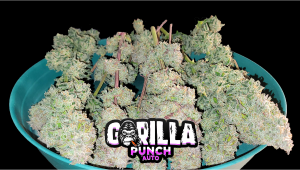
- 1. Grow specifications
- 2. Grow set up
- 3. Germination and seedling stage | week 1
- 4. Early veg | week 2
- 5. Mid veg | weeks 3-4
- 6. Transition (pre-flower) | week 5
- 7. Early flower | weeks 6-7
- 8. Mid flower (bulk phase) | weeks 8-9
- 9. Ripening and harvest | weeks 10-11
- 10. The outcome
- 10. a. Gorilla punch auto yield
- 10. b. Gorilla punch auto smoke report
- 11. In conclusion
With Gorilla Punch Auto, Fast Buds continues to extend its collection of hard-hitting strains and presents a smoke for those users who can take a punch without going into a standing knockout after a single puff. Apart from the potency, this is a very invigorating and motivating smoke perfect to use in moderation throughout the day. Another requirement for any state-of-the-art autoflower is its yield potential, and this is where this newcomer also shines. Of course, you need to know a thing or two about weed cultivation to get the most out of this wonderful plant which is exactly the subject of this article.
In our Gorilla Punch Auto week-by-week growing guide, we describe four indoor grows in which the growers employed no fancy techniques but focused instead on the essentials. And this is the most important thing in cannabis cultivation whether you're a newbie or not.
1. Grow Specifications
Gorilla Punch Auto has one of those genetic makeups that are every grower's dream – an almost equal mix of 45% Sativa and 55% Indica. This means that you'll get a big and vigorously developing but not overly tall plant that can reach a height of 70-120 cm (28-47 inches) and can be easily trained for a shorter profile. This is a very comfortable size to work with indoors, but it's enough for you to harvest generous yields of up to 450-550 gr/m2 (1.5-1.8 oz/ft2). Outdoor cultivation will bring you between 50-150 gr/plant (2-5 oz/plant). It's amazing that you'll only need 8-9 weeks from seed to harvest to achieve such spectacular results.

Rest assured that your experience smoking the buds will be just as rewarding. The flavor profile of Gorilla Punch Auto is complex and combines influences as diverse as spice, lemon, wood, and pepper. You'd want to keep inhaling this delicious smoke but beware of its potency – up to 26% THC with a CBD level never going beyond 0.5%.
2. Grow Set Up
Out of a few dozen Gorilla Punch Auto grow diaries that are online, we have chosen four that were done by gardeners with different levels of experience. Only one of them used a very powerful light, and the lights of others were nothing special. However, the final results were remarkable for all of them.
| Grow Space | Light | Medium | |
|---|---|---|---|
| A | 1.2 m2 | 480W LED | Batmix Soil |
| B | 1.2 m2 | 150W LED | Coco/Perlite |
| C | 0.37 m2 | 420W LED | Soil/Clay Pebbles |
| D | 29.73 m2 | 630W LED | Roots Organic 707 Soil |
Both these four runs as well as the others that we have looked through tell the story of a marvelously versatile genetics that is able to perform in any setup and flourish under any conditions.
3. Germination And Seedling Stage | Week 1
Germinating cannabis seeds is a very simple and straightforward process. The three things that you need to germinate successfully are warmth, darkness, and the presence of water, so anyone can do this. However, experienced growers tweak these conditions to raise the success rate and to make the seeds pop and sprout faster. It can be the scuffing of the seeds with sandpaper, pre-soaking them in a glass of water, adding hydrogen peroxide, using rooting hormones, etc, but you don't really need any of that to see your seedlings come up.
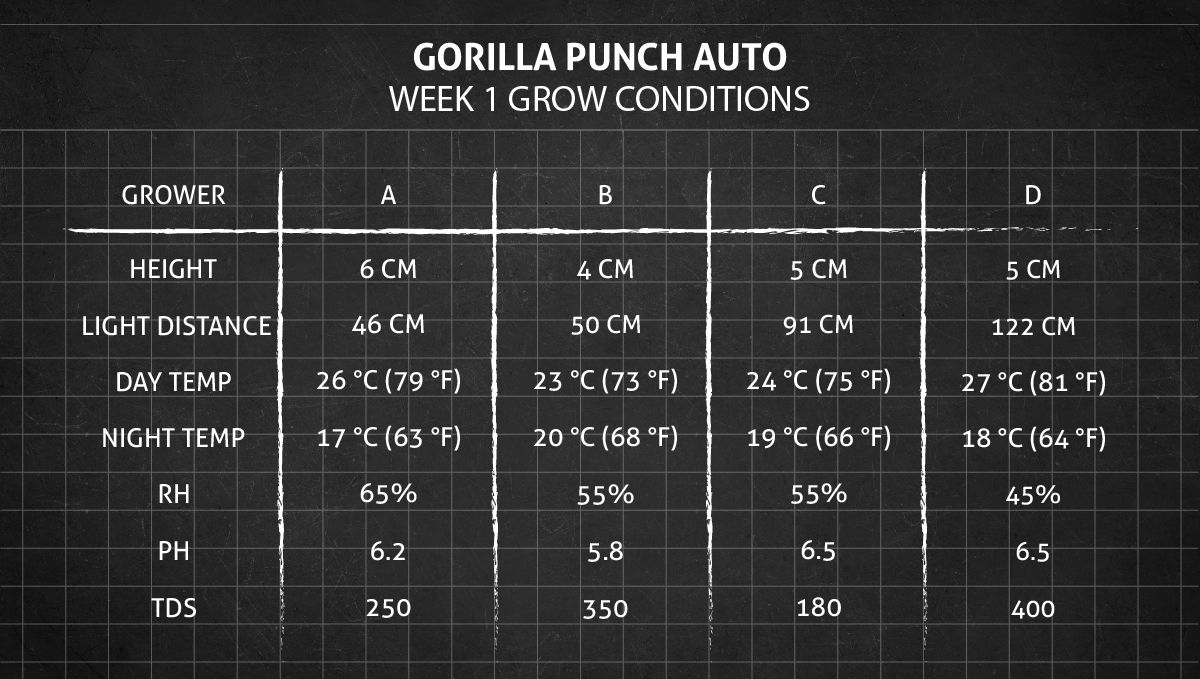
Most gardeners choose a germination technique that is as straightforward as it is effective: they place the seed between wet paper towels until it cracks and shows a taproot. You can achieve the same results by letting the bean float on the surface of water. When the taproot is about half an inch long, put your seed into the medium, and be very gentle about it.
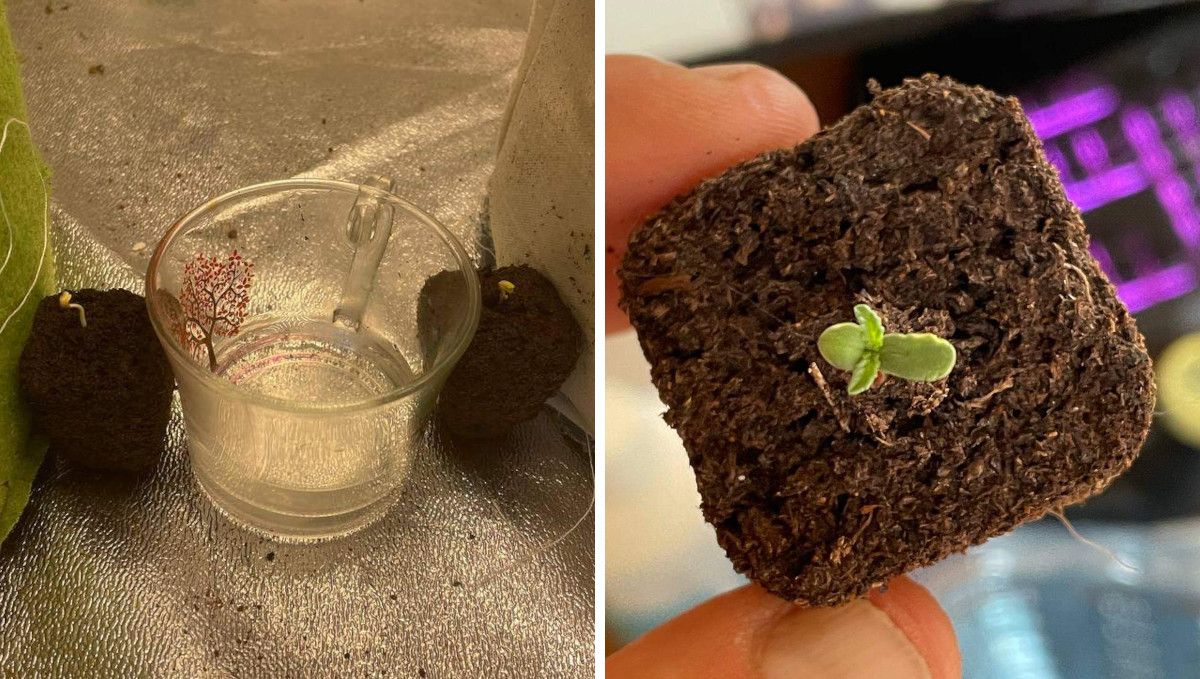
When you finally plant your seed into the medium, you have two options: either start with a small pot (with the intention of re-potting later) or put the seed straight into the final container. The first method is great for photoperiod varieties as it allows you to save on grow space during veg and makes watering so much easier.
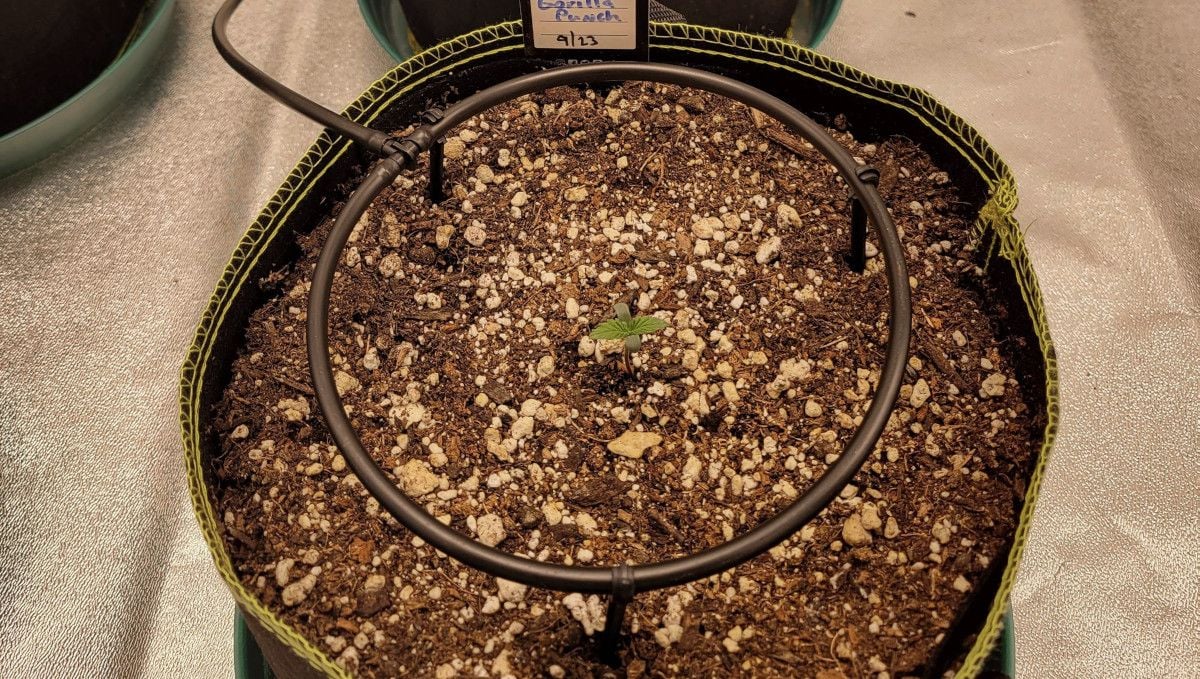
The other one allows you to avoid re-potting which is a potentially dangerous procedure that requires some dexterity and experience. So, if you're new to this game, start your autoflowers in the final pot from the get-go. Otherwise, you risk shocking your plant during the transplant.
Little sprouts prefer highly humid conditions, so if you can, keep the relative humidity in your grow-room at about 70-80%. If it isn’t possible, just cover the seedling with something transparent – this is enough to raise humidity levels locally.
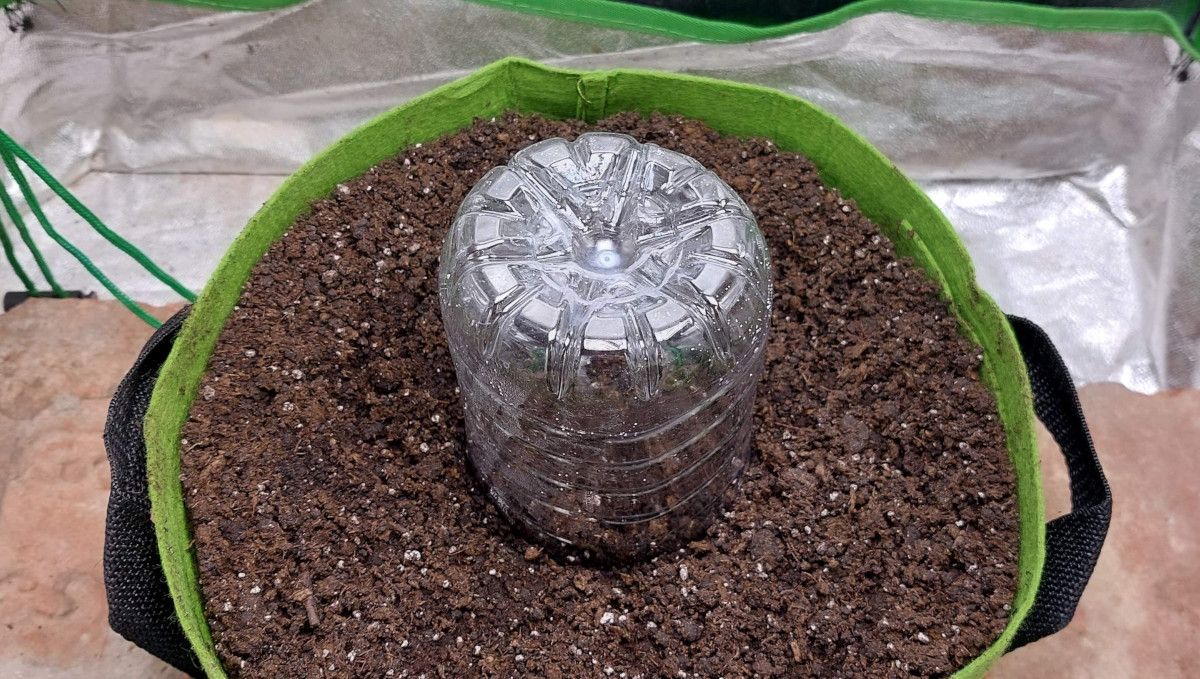
If your seedling likes the environment you’ve created and gets just the right amount of water and light, it will show small but noticeable changes every day and look something like this at the end of the 1st week.

If you look at your seedling at this stage and don't really know whether she develops as she should or lags behind, wait for the second week. Your benchmark is day 10 when the second pair of true leaves should be at least as big as the first one. It means you're doing okay.
4. Early Veg | Week 2
Ar first, a weed seedling doesn't grow very fast, but starting from the second week from seed, you will see changes every day. At this point, the seedling still likes it warm and humid, but she's not so vulnerable anymore, so you can remove the humidity dome (if you used one) or lower RH in the grow room with ventilation or a dehumidifier to something like 60% instead of 70-80%.
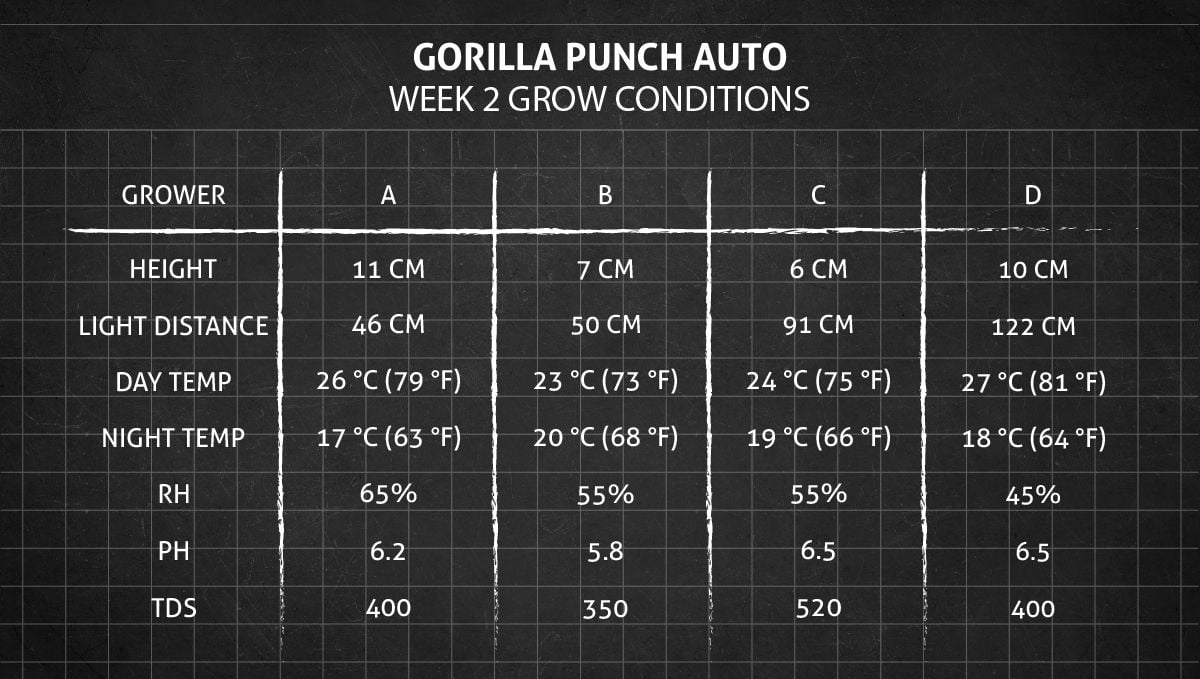
At this time, most autoflowers don't look like they need training – because they are still low and stocky – so you may just leave your baby be and not distract her from the serious business of extending her roots and working on the above-ground part (leaves and side branches).
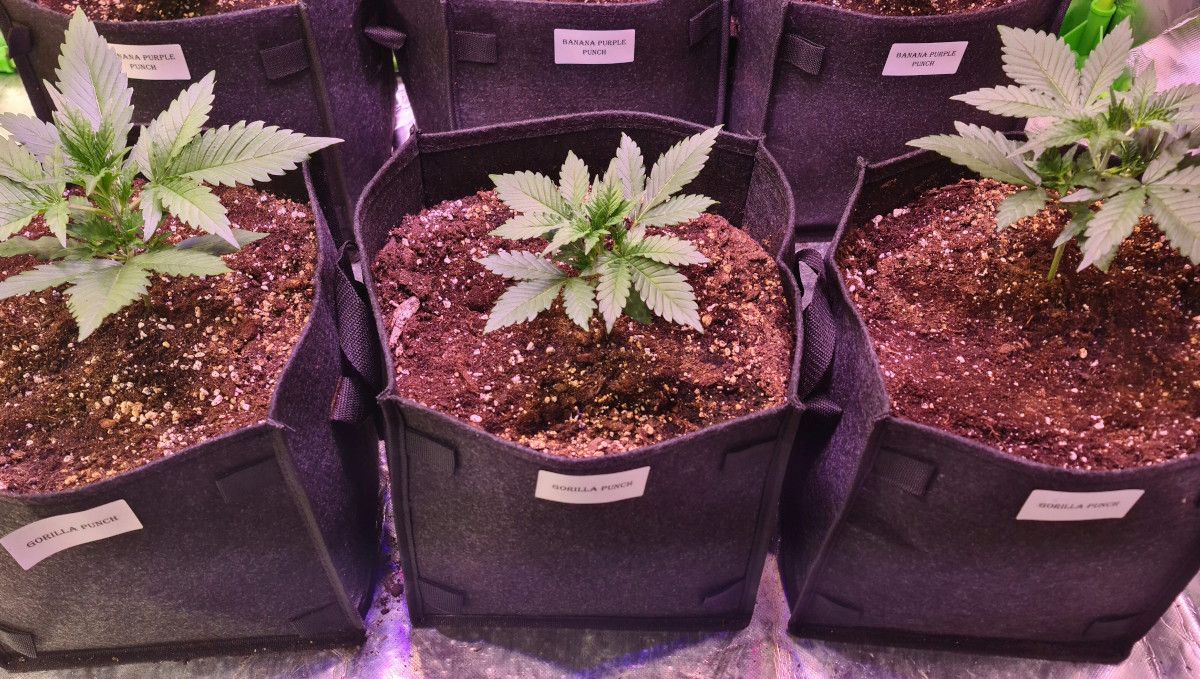
Don't forget that any form of high-stress training or even low-stress training may shock an autoflower if you're not gentle enough. Besides, Gorilla Punch seems a naturally bushy autoflower, which is eveidenced by a rapid growth of side branches as early as the 2nd week from sprouts.
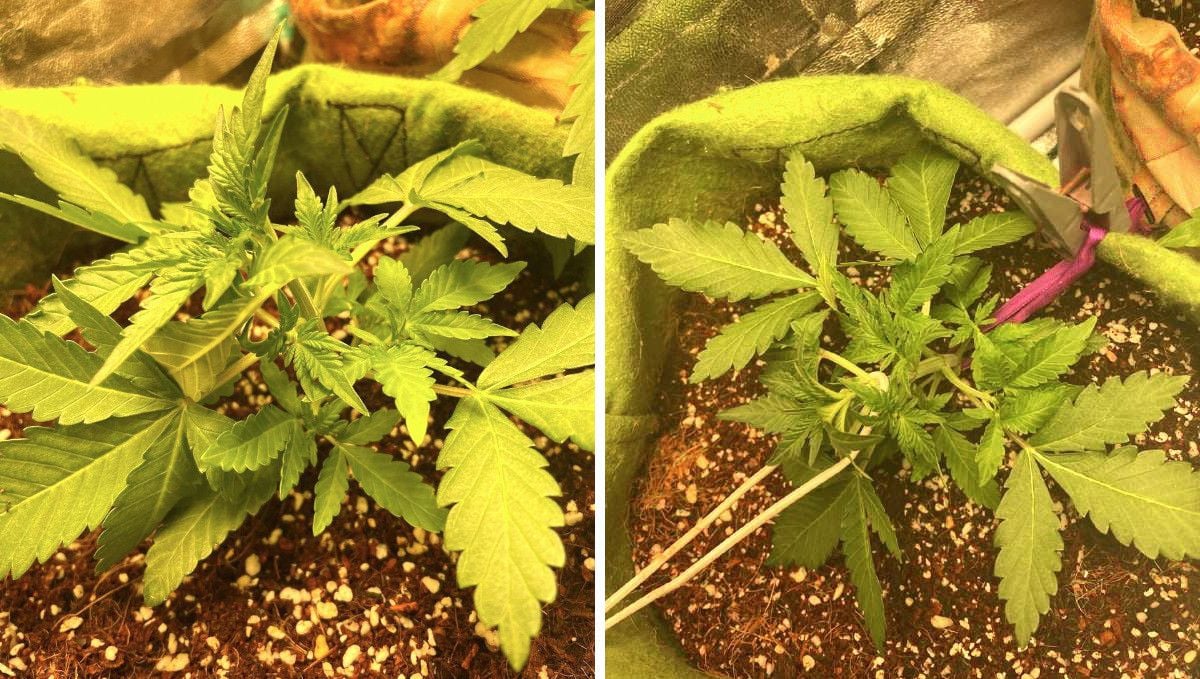
Novices should be aware that sometimes young weed plants have strange leaf mutations. Don't panic! Countless grows have shown that what starts as an ugly little mutant in veg, often turns into a breathtaking and gorgeous beauty by harvest.
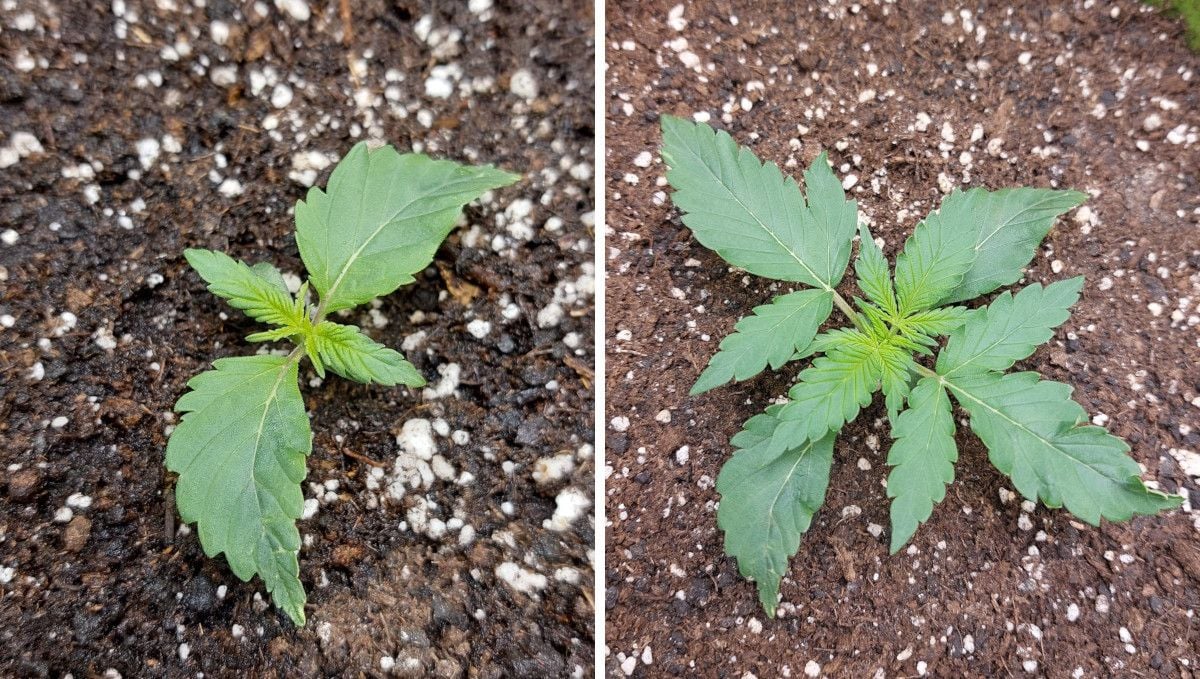
5. Mid Veg | Weeks 3-4
Starting from week 3 or thereabouts, autoflowers enter the vegetative stage when they grow the fastest. They develop new branches and nodes – where the future buds will form – so make sure you create the best conditions for them now. Later, in flower, it will be too late – flowering plants stretch whatever branches they have but hardly make any new ones.
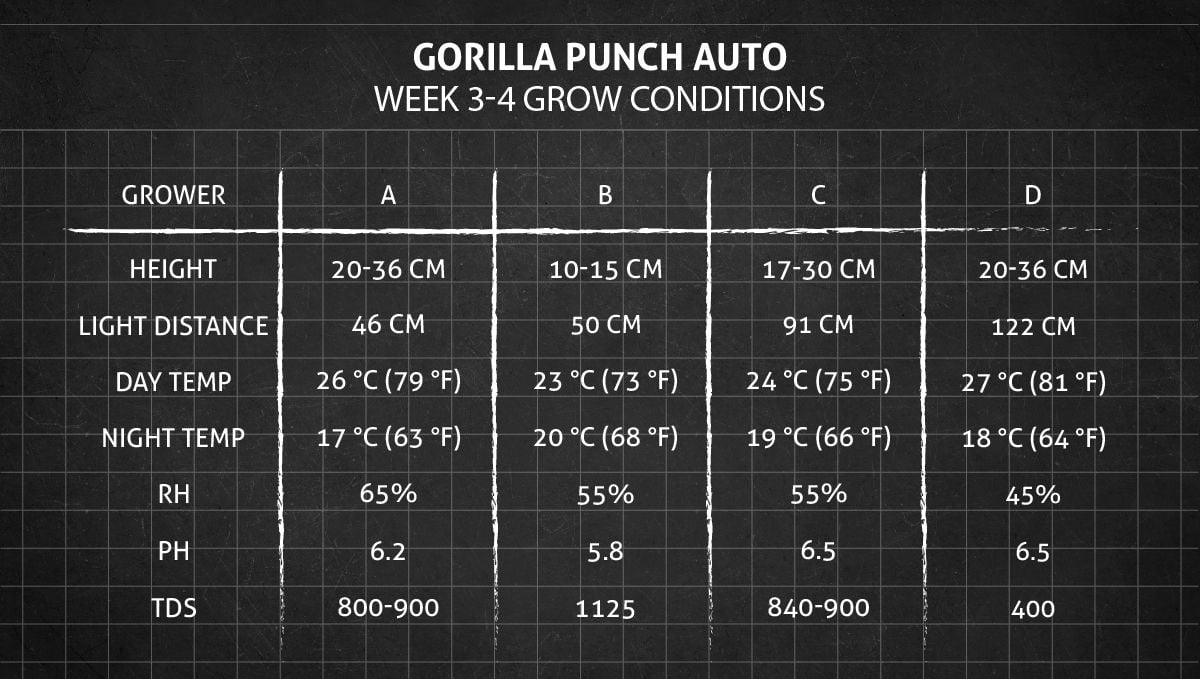
As you can see in the pic below, Grower A’s Gorilla Punch autoflowers became quite bushy on their own. However, the grower decided to boost the growth of side branches by low-stress training the central stems. This exposed other important growing points, thereby giving them a significant boost.
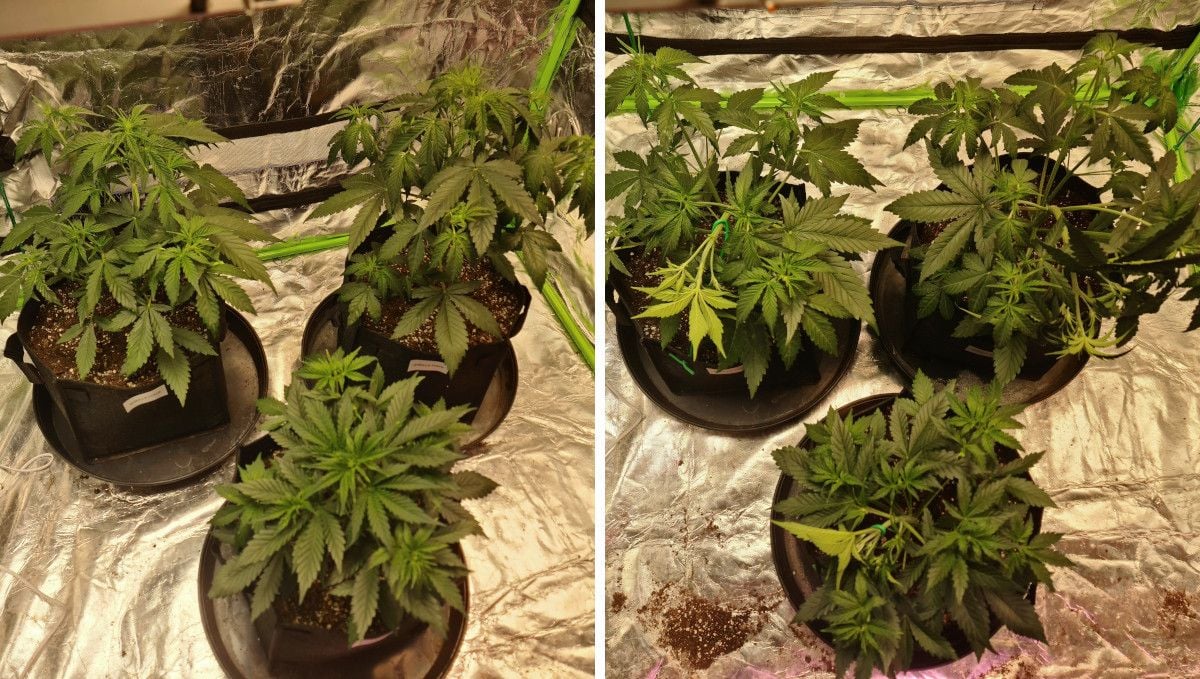
As the plant grows, she will need more and more energy, and you should make sure every side branch is exposed to full light. Tucking in the leaves seems to be the least stressful way of achieving that, but modern autoflowers can tolerate more stressful procedures (at least, in experienced hands). Even topping or FIMing your auto won’t prevent you from getting a great harvest.
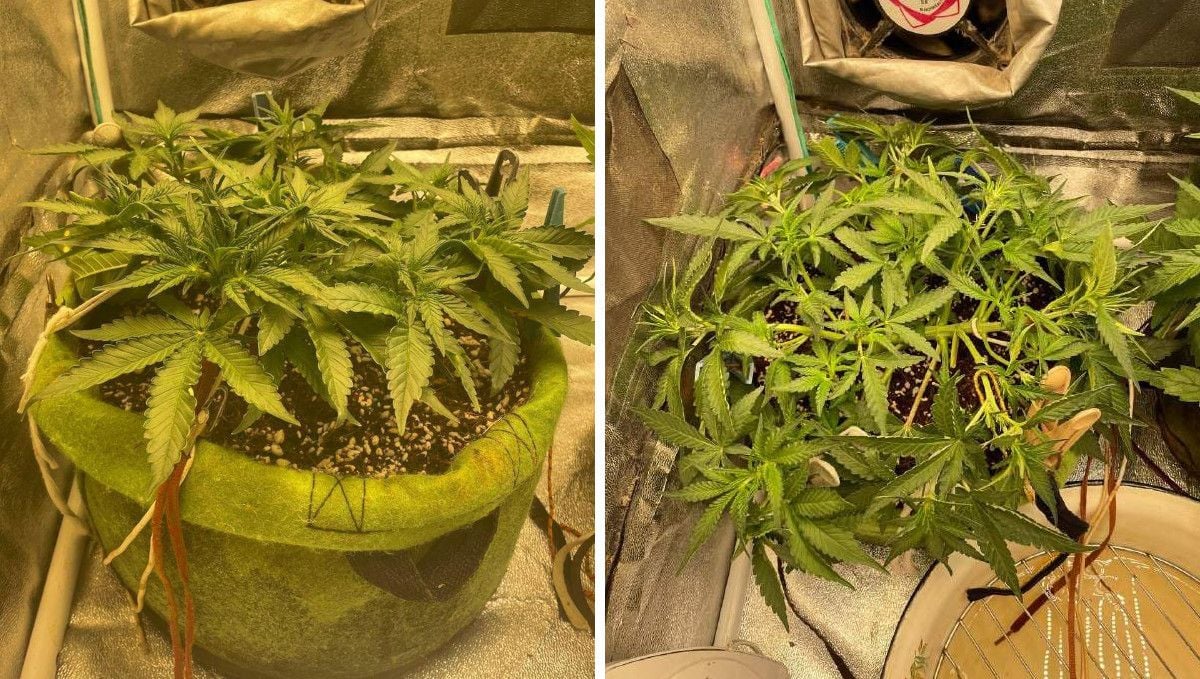
When you grow in soil and use enough medium, it usually is pre-loaded with enough nutrients to last you for at least the first two weeks from seed. Probably, even for the whole veg. Nevertheless, many growers choose to add small amounts of nutrients (something like ¼ of what the manufacturer recommends) right from the start.
Look at the table below to see how an experienced grower handled feeding. (It’s not necessary to copy his regimen exactly, but its principles are very sound.) He used such products as Silica Von Liebig Special to provide for stronger cell walls, Take Root to make a stronger rhizosphere with essential micronutrients and vitamins, and Multi Total as a source of humic and fulvic acids.
He also introduced V2 Vegetative Part 1 and 2 as the staple product rich in nitrogen (N) and would later add a Cal-Mag formula to make sure that his Gorilla Punch Auto didn't experience calcium and magnesium deficiencies. These two deficiencies mostly plague coco grows but are quite common in soil grows too.
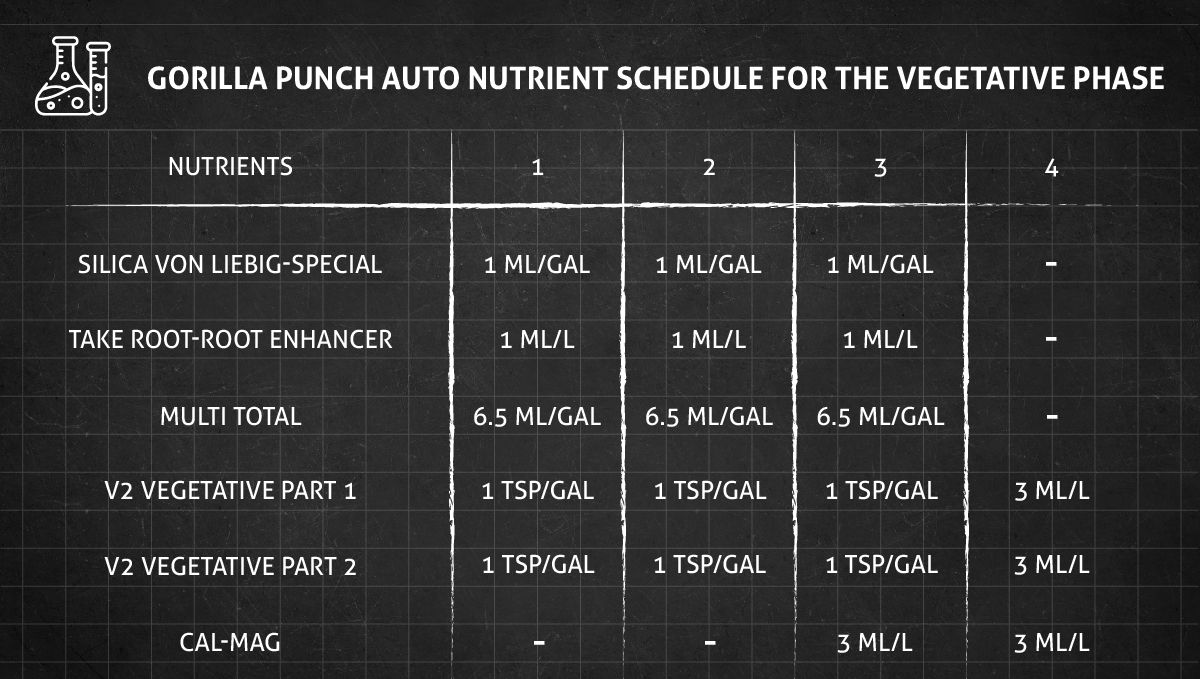
One challenge of growing autos is that their veg is so short that you may see the first signs of flowering as early as week 3 (look closely at Grower C’s Gorilla Punch in the pic below). This means that you should do your best to make every day of veg count.
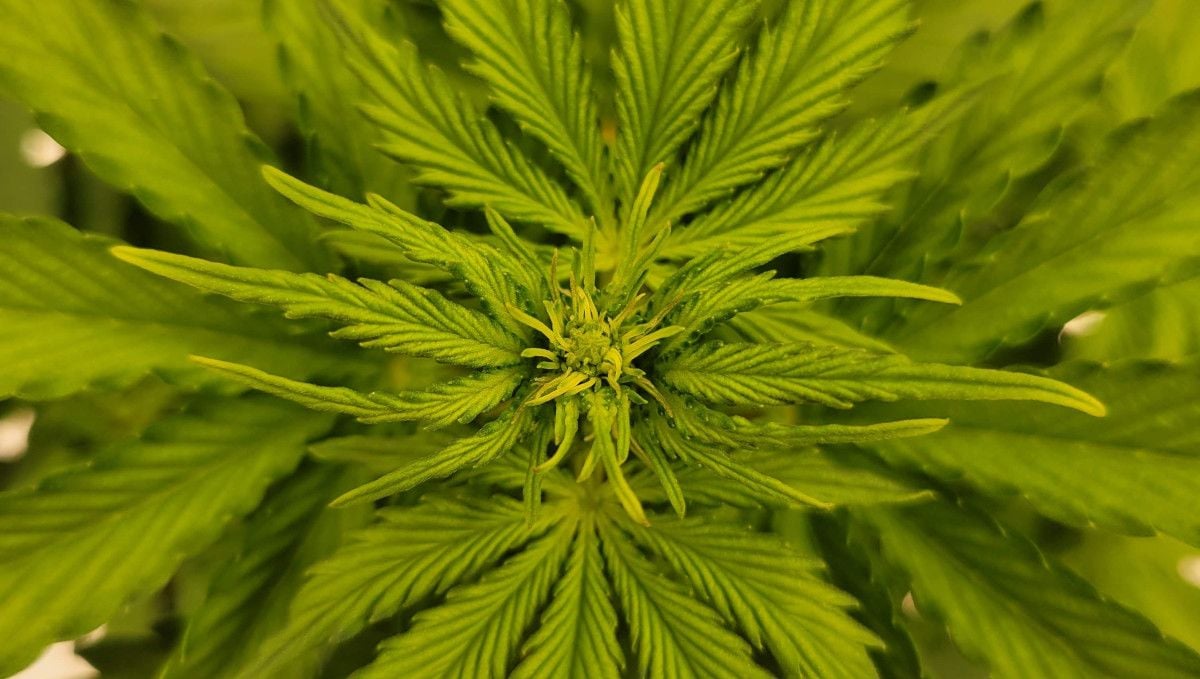
Even the plants that start kind of slow (as was Grower C's case), pick up the pace in late veg. Do right by them, and they'll turn into perfectly healthy and beautiful bushes.
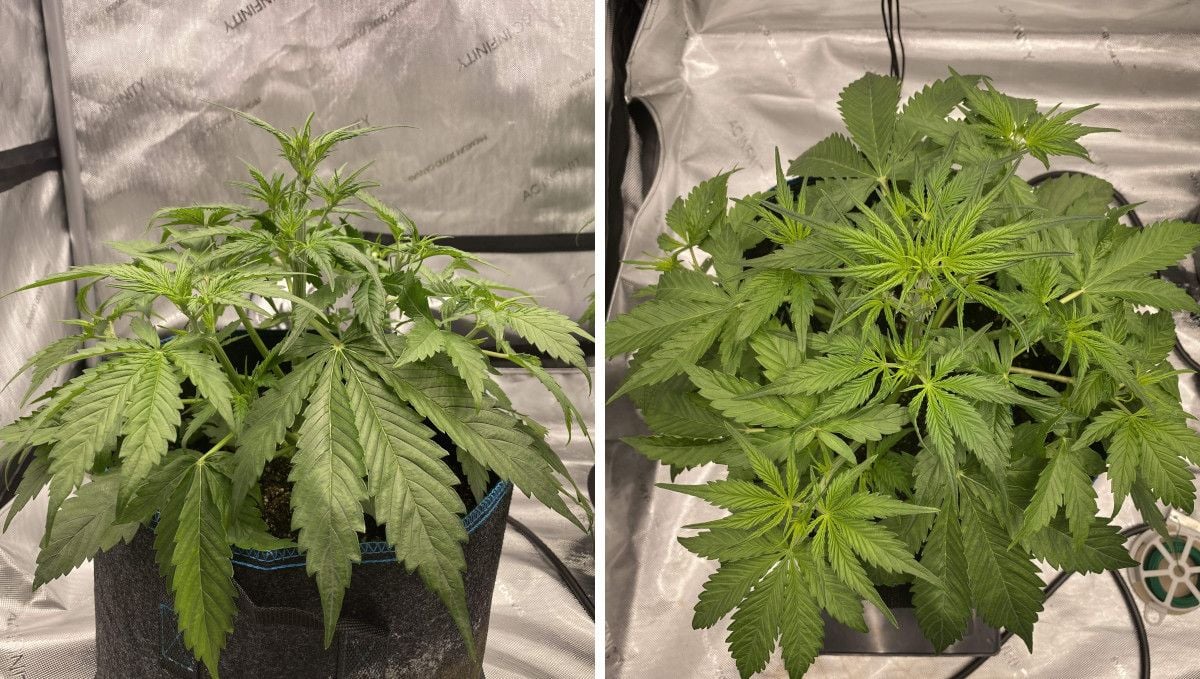
6. Transition (Pre-Flower) | Week 5
When the flowering starts, you can make it a bit cooler in the grow room. Aim at something like 73-77°F (23-25°C), with the night temps lower by a few degrees.
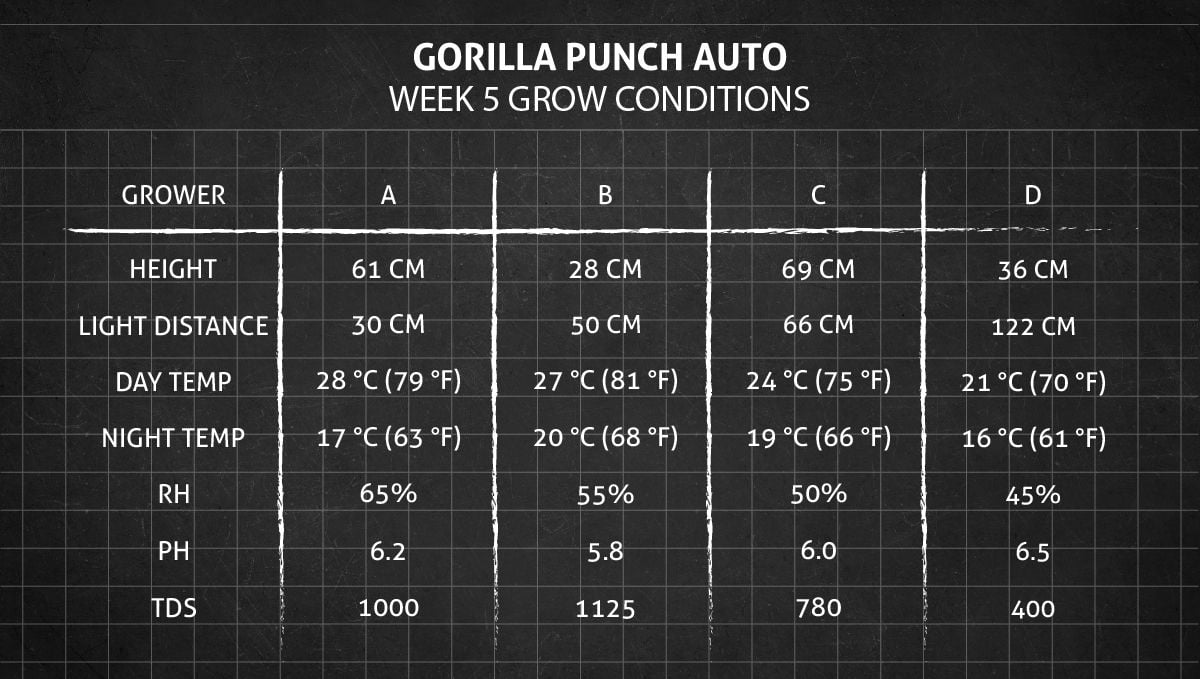
Most autoflowers show sex and transition to budding around week 5, and Gorilla Punch Auto is no exception – in most grows that we’ve reviewed, she had the first female pistils around the fifth week from seed or earlier.
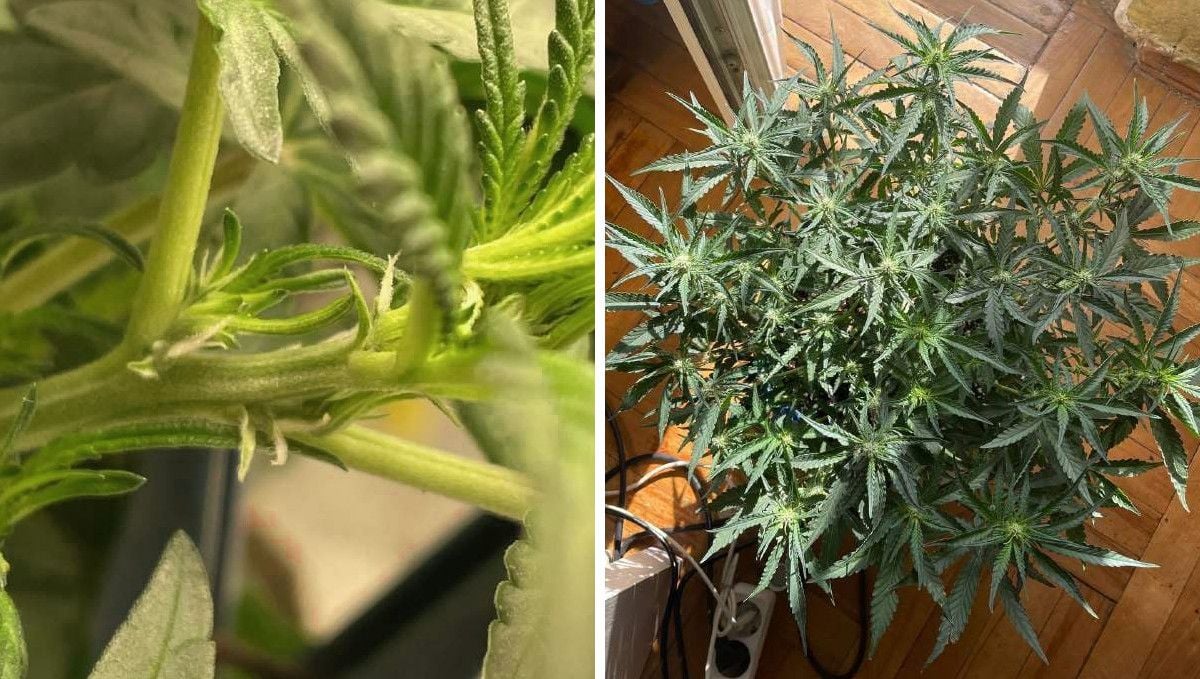
If you look closely enough, you can see the early signs that the flowering is about to begin. The first signs of sex are tiny white hairs that you can see at the nodes somewhere halfway down the main stem. As things progress, you'll see more and more of these at other nodes and most importantly on tops. Besides, the tops will slightly change color to more yellowish than before and have much thinner little leaves than before.
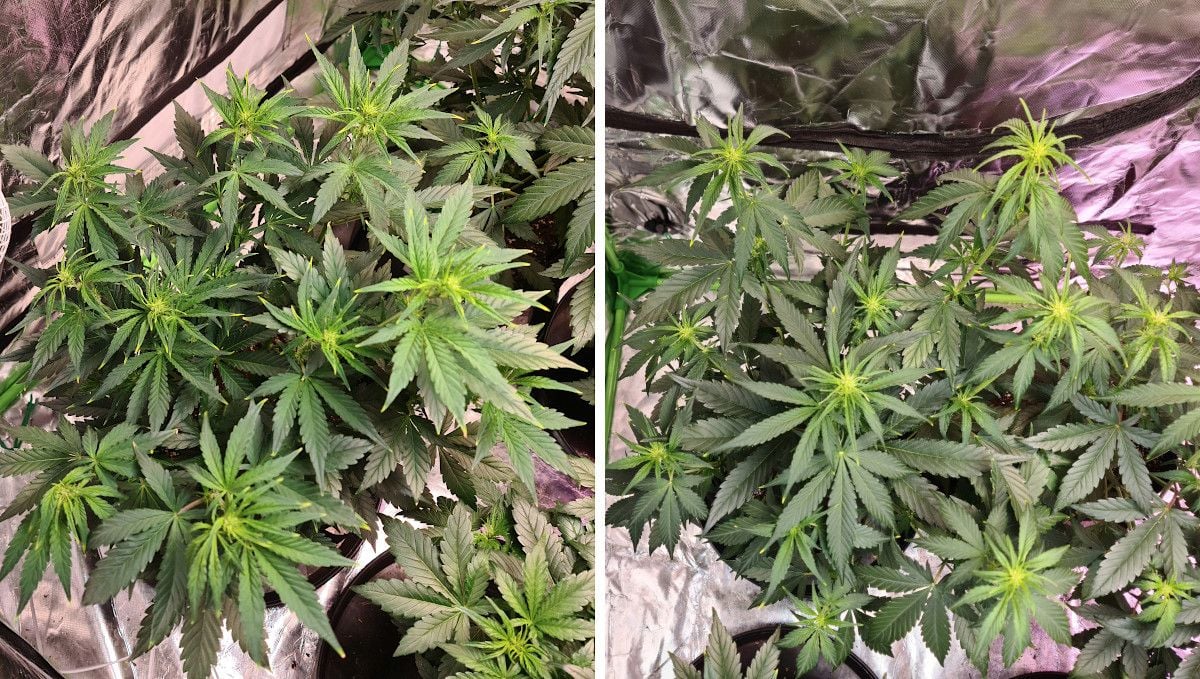
When the flowering starts, don't forget to change the feeding regimen. Usually, you will have two sets of nutrients: one for vegetative growth and one for the flowering stage. We've already mentioned nitrogen (N) as the macronutrient that is especially important for vegetative growth, but when the plant switches to flowering, choose a formula whose NPK is tilted toward P and K – phosphorus and potassium. These two are needed in greater quantities now while N is of lesser importance and too much of it can even be bad for flower development.
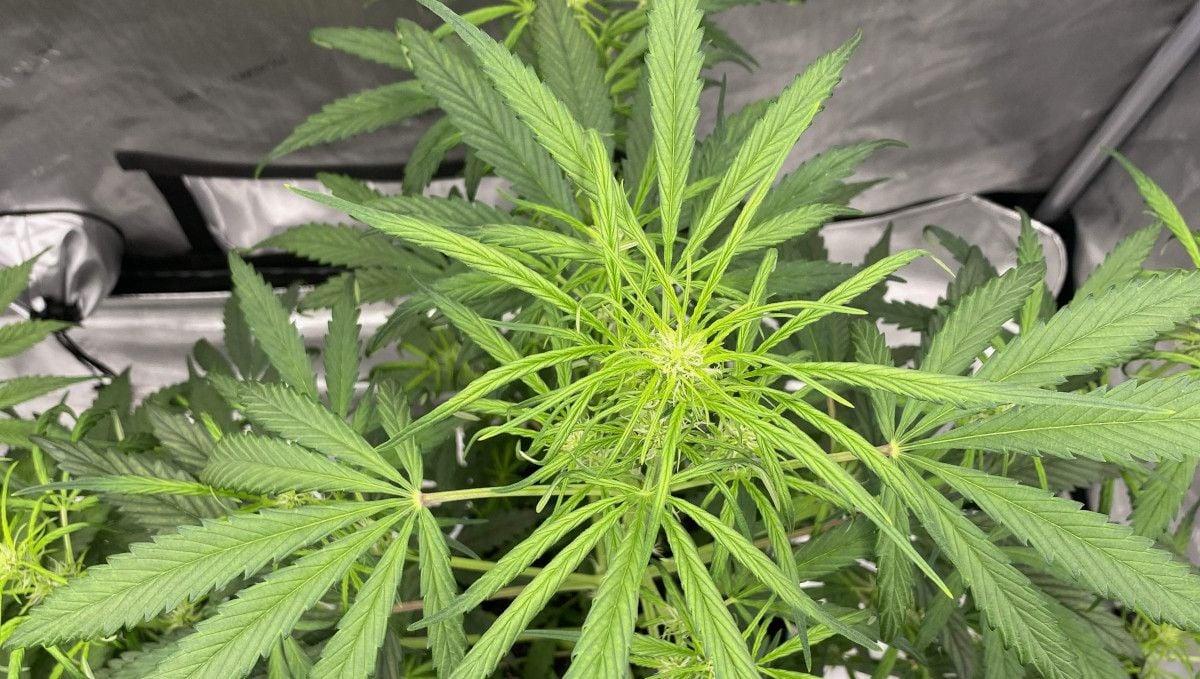
7. Early Flower | Weeks 6-7
After an autoflower has entered the flowering stage, it will spend a part of its energy on stretching. Depending on the genetics, weed plants can double or even triple in size although a more moderate growth of +50% is more common.
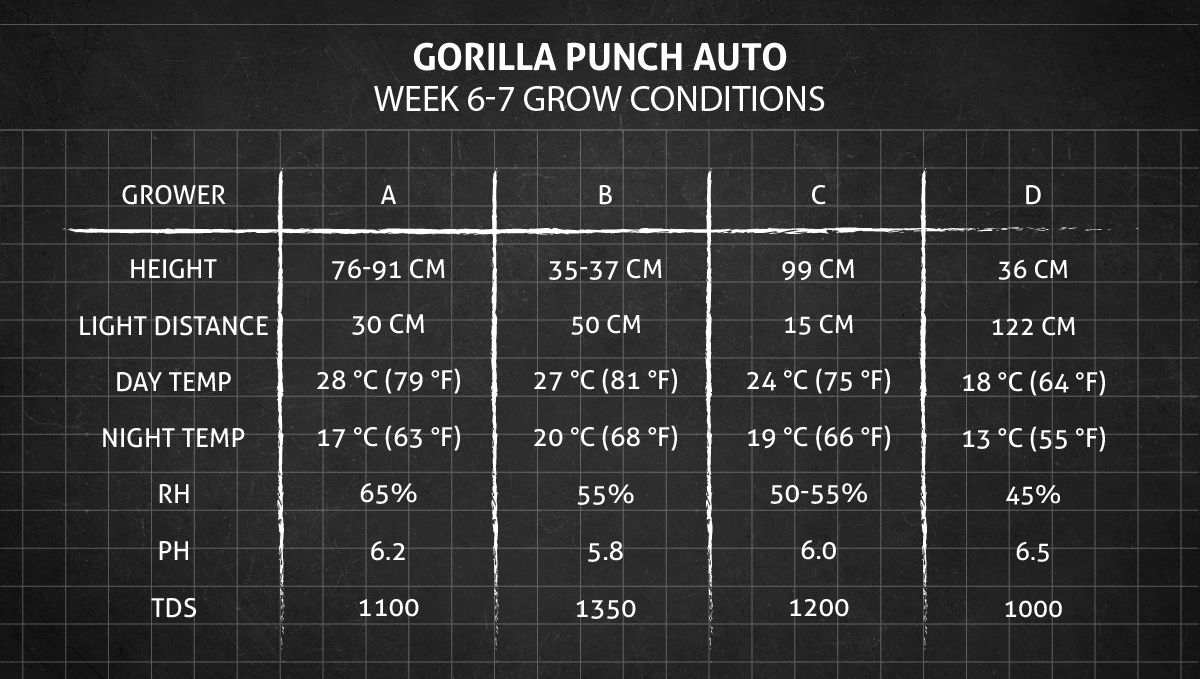
With photoperiod strains, it's important to induce flowering at the right moment so that you don't run out of vertical space later. With autoflowers, you don't have this issue: they just start flowering when they're ready and this usually happens when they're still small enough.
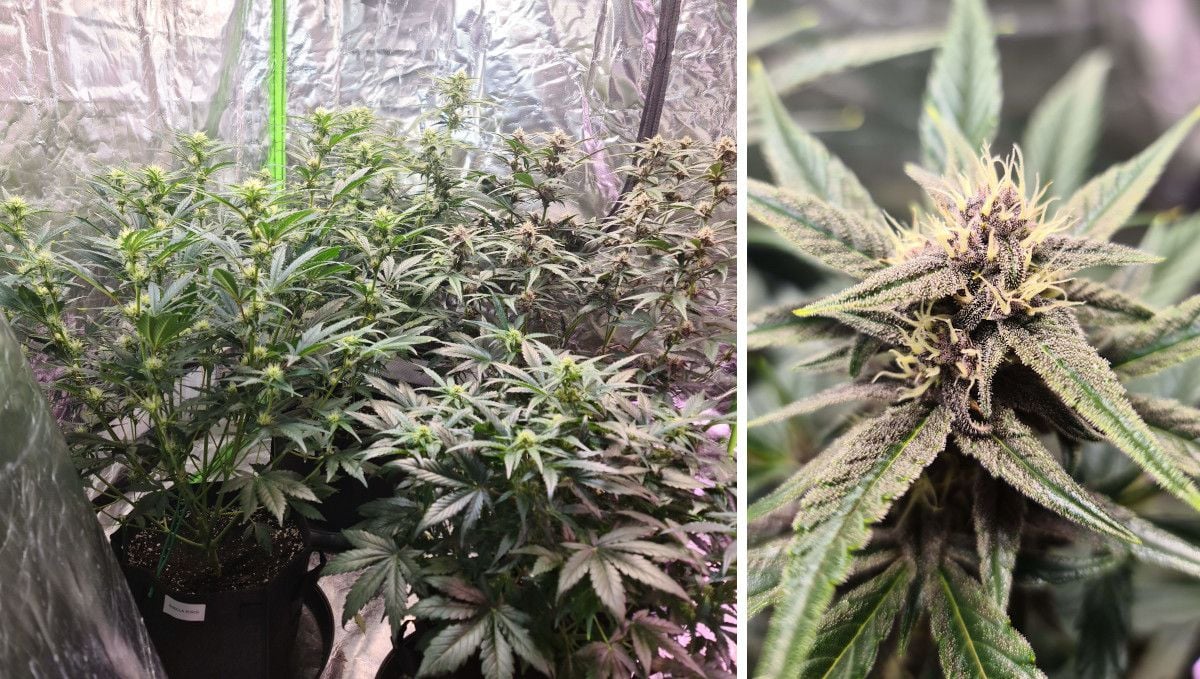
Of course, besides stretching, another important process goes on. We mean the formation of buds. At first, you may wonder how these scant little flowers can form long continuous colas, but most of the time they do – just give them a few weeks and they'll fill all the gaps.
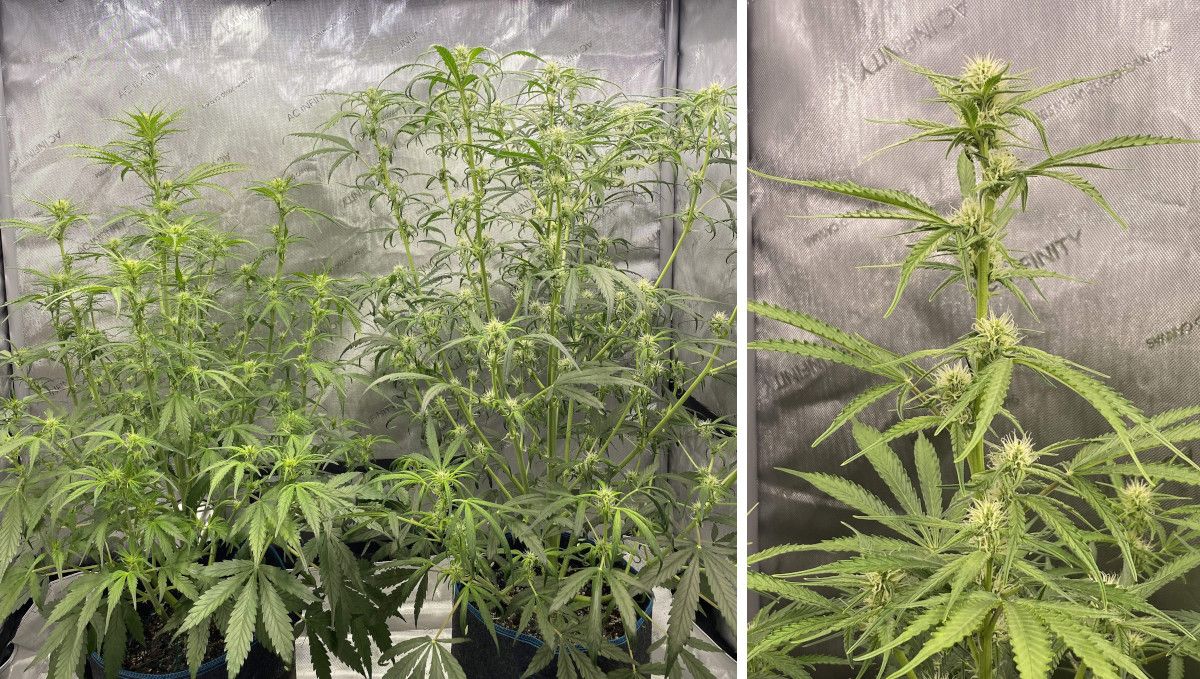
As you can see in the pictures above and below, Gorilla Punch Auto can have a central stem that leaves all the side branches far behind or can be trained to stay level with the rest.

With powerful lights, the central stem overtaking the rest isn't an issue, but if you're running weaker lights, you may end up in a situation where the top of the central stem is close enough to your LED panel to get a light burn but the rest of the bush is too far and so those lower buds will have a smaller size and airier texture. In this scenario, you'd be much better off if you had started to LST your autoflower very early and had a more or less flat canopy by now.
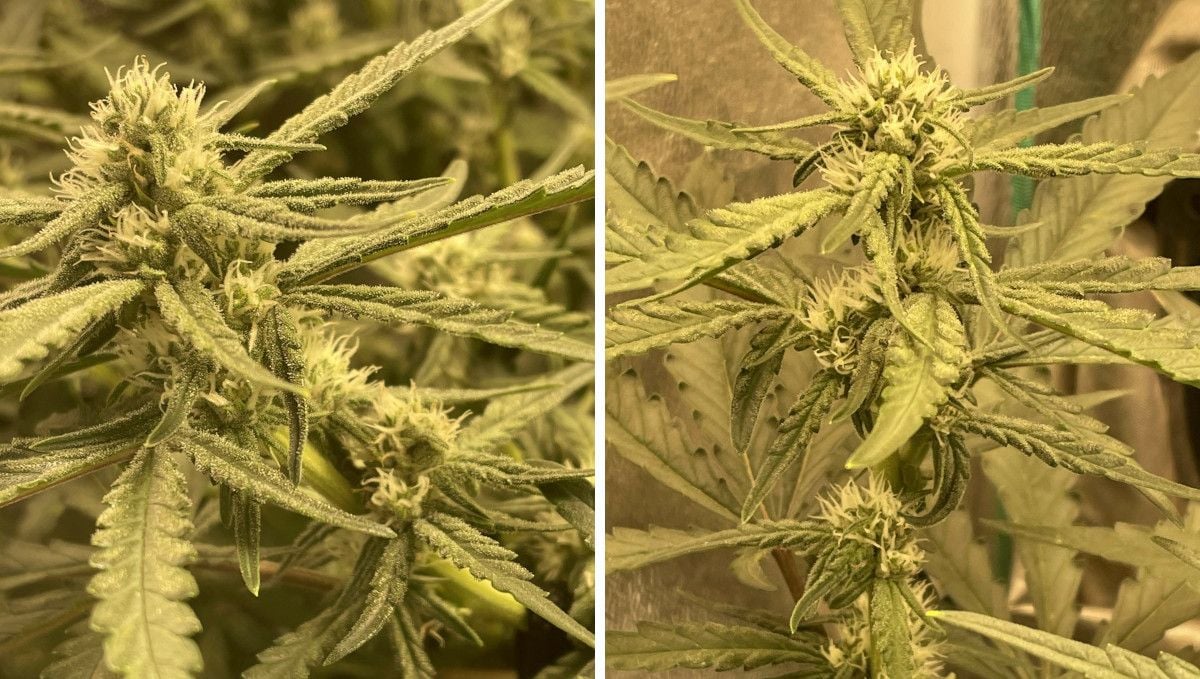
8. Mid Flower (Bulk Phase) | Weeks 8-9
When cannabis starts to really bulk up, it's the perfect moment to decrease the relative humidity to something like 40%. Low readings like this help prevent such high-humidity issues as mold and bud rot which are all too common both indoors and out.
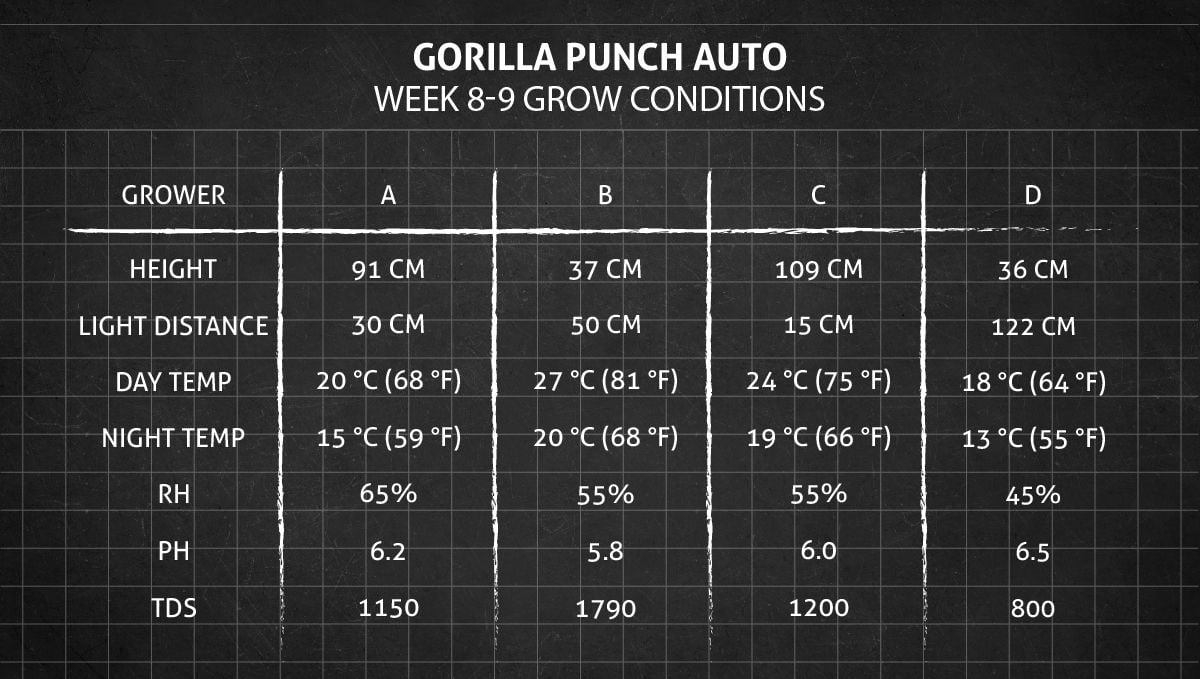
While buds are fattening up and getting denser, they also get abundantly covered in trichomes, and since trichomes hold the majority of terpenes, this is the time when your garden starts to smell really strong.
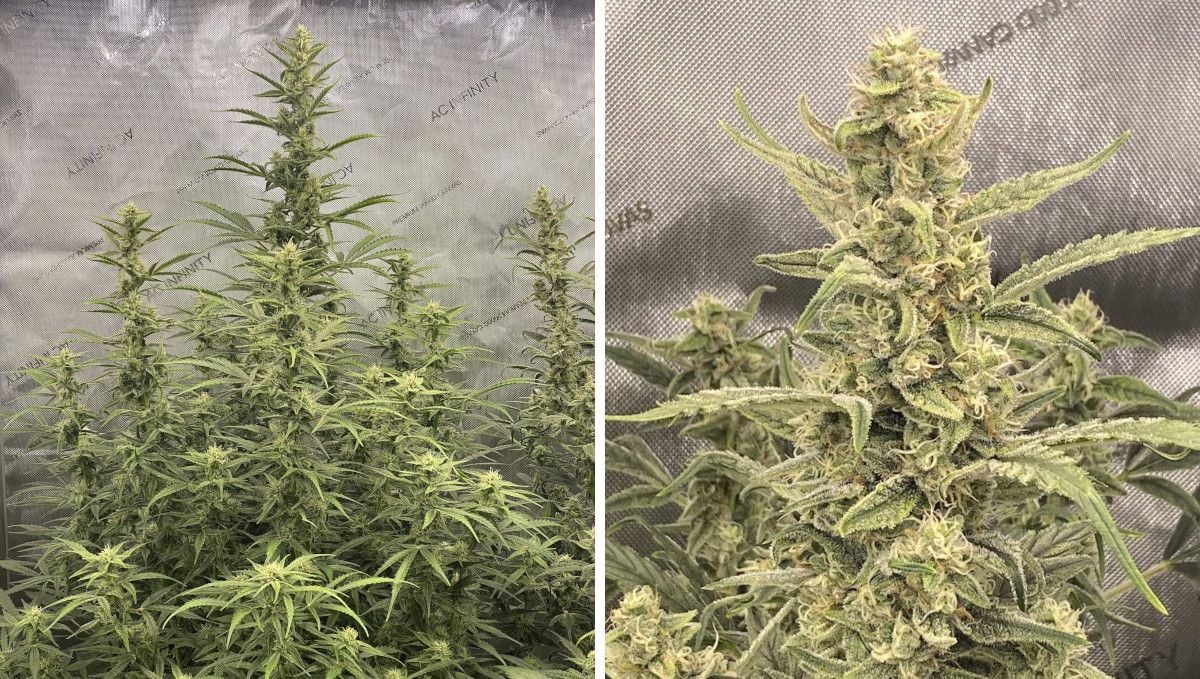
If you use a good exhaust fan and take the air outside through a system of ducts, you may get rid of the smell produced by one autoflower. Not completely, of course, but down to an acceptable level where it won't be too much nuisance to you or your neighbors. However, in larger indoor gardens, installing a carbon filter is a must.
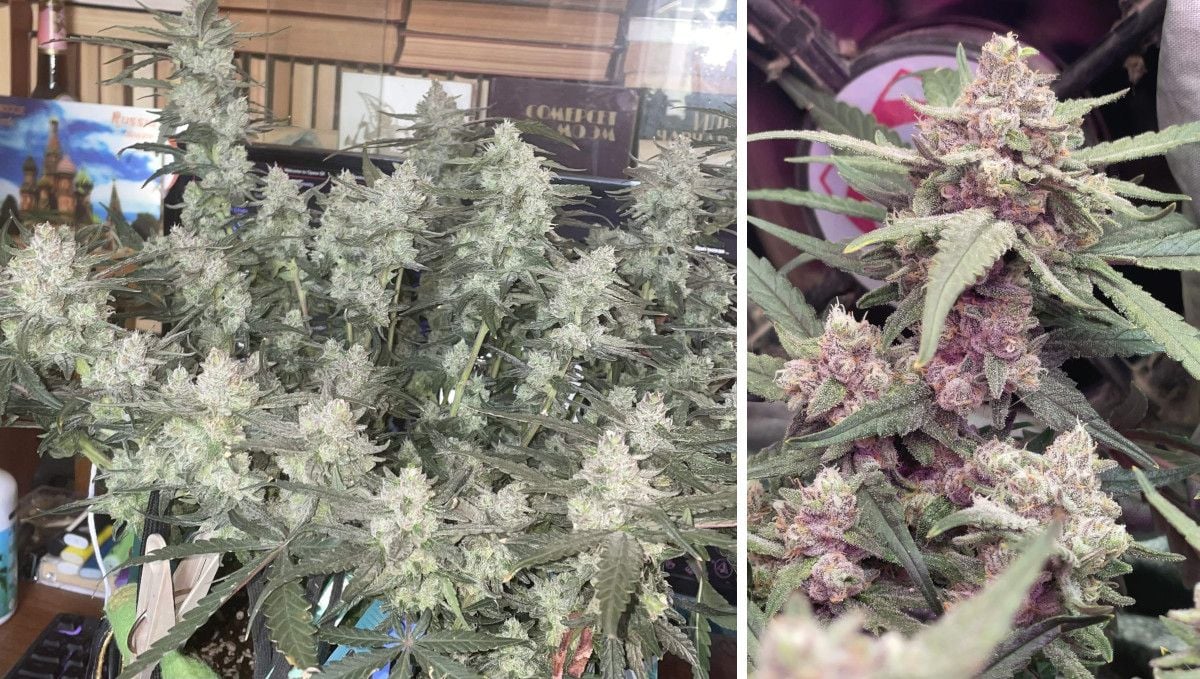
At some point, the flowering stretch stops completely, and it's the first sign that the harvest is not far away.
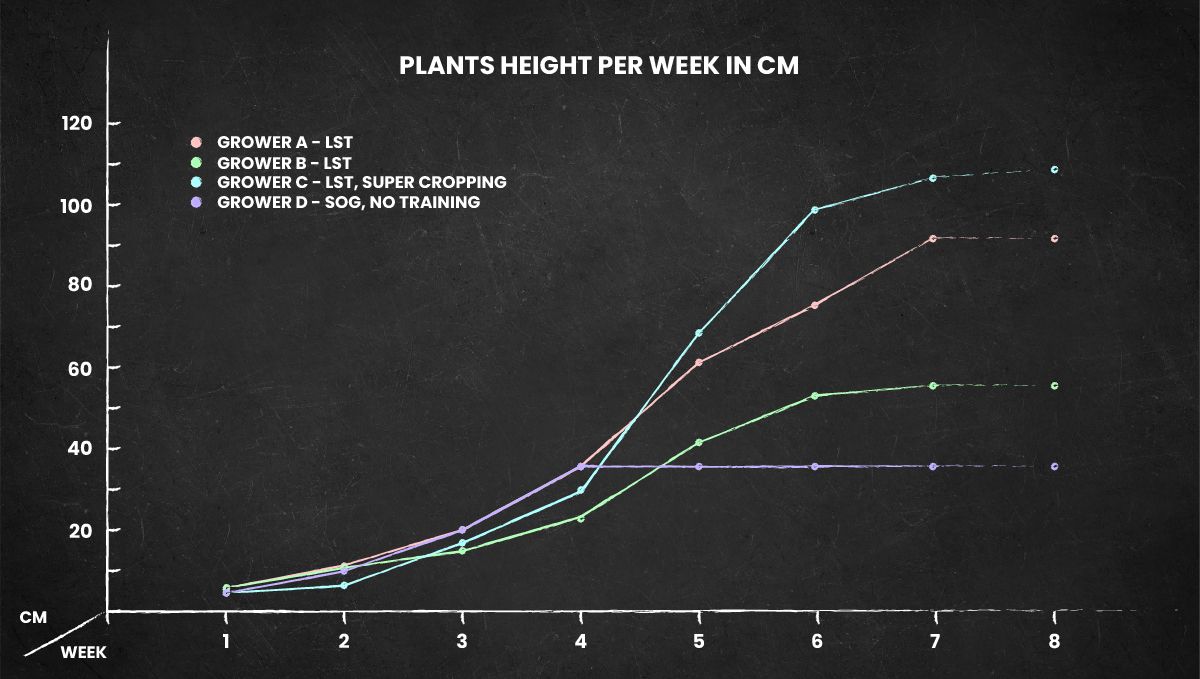
The buds may continue to fill out visibly for another couple of weeks, and then you'll stop noticing any changes in their size as well. That's another sign of an impending harvest. And of course, you'll notice new and interesting colors: the pistils that have been pure white before will start to turn amber or brown, and the calyces and leaves may start to fade and display some autumn hues.
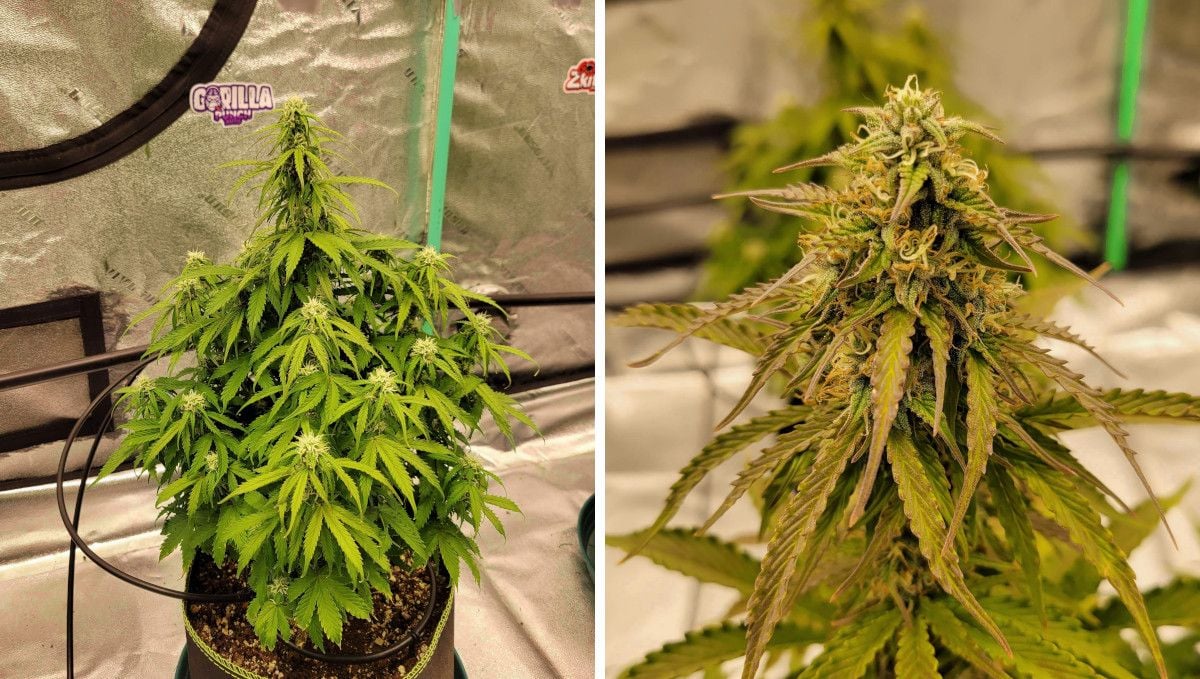
Btw, Gorilla Punch Auto – though not as purple as some other strains – has a tendency to go purplish. You can facilitate this by lowering the temperature, especially when the lights are off.
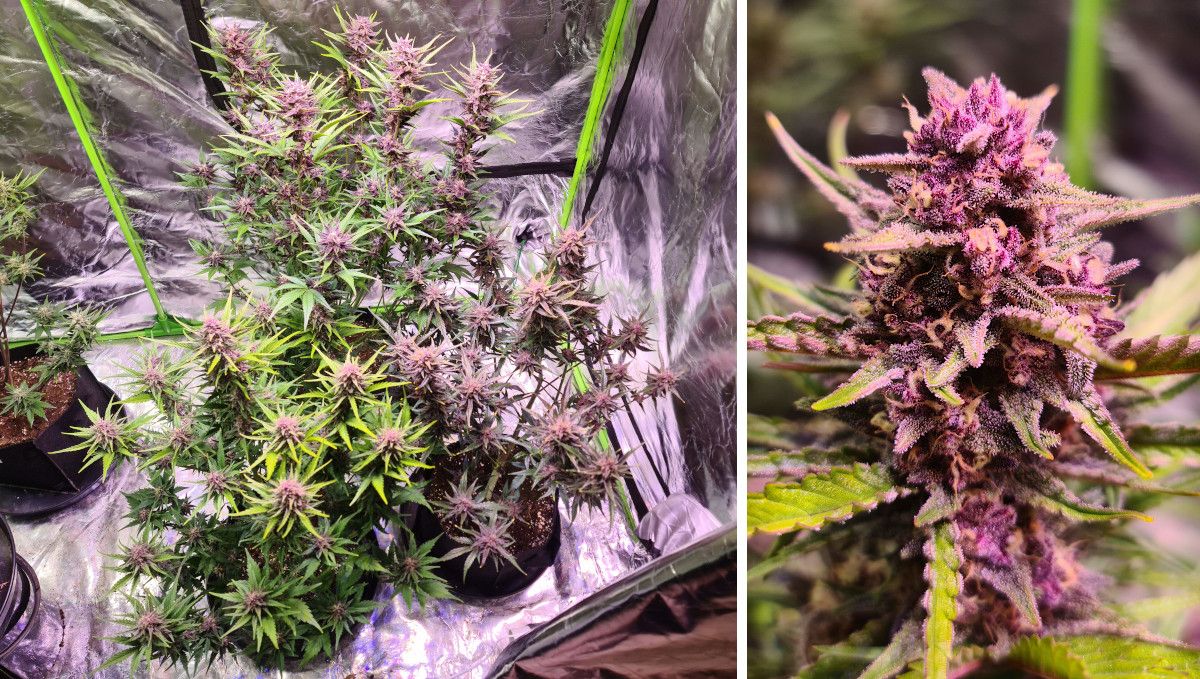
9. Ripening And Harvest | Weeks 10-11
In the last few weeks leading to the harvest, you may stop seeing any evident changes in how your buds look and may start to wonder if it makes sense to wait or if you should just chop your plant. However, don't be in a hurry.
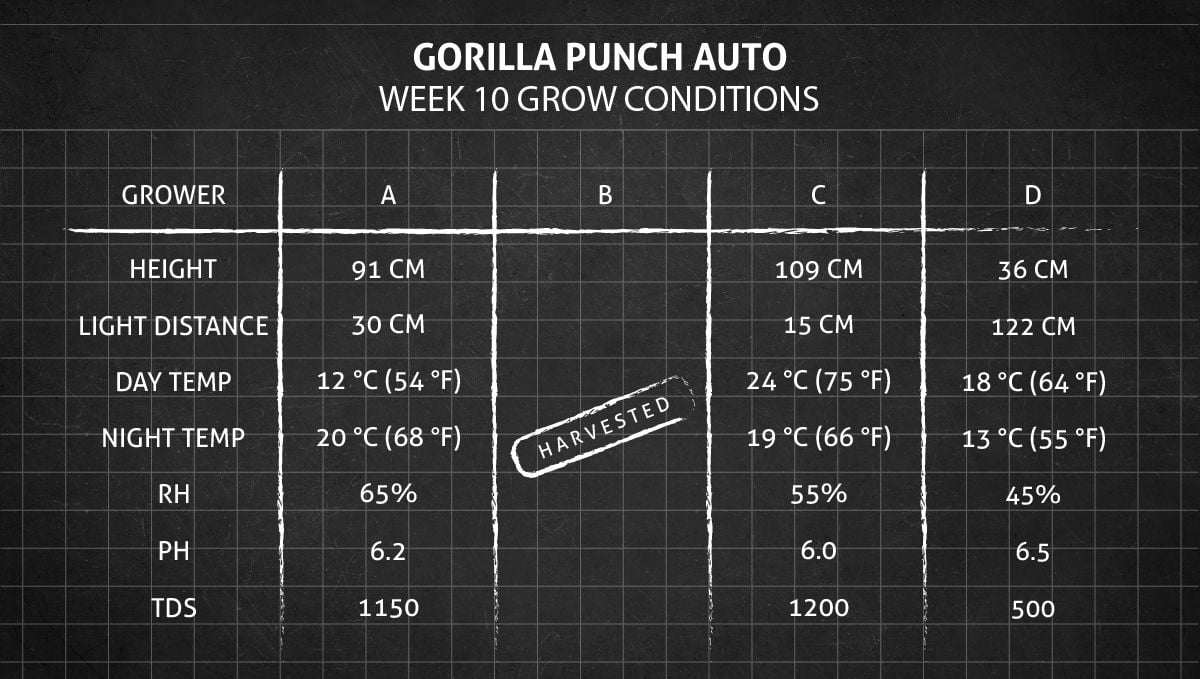
Though the buds have probably reached their final size, there are invisible chemical changes still going on inside them. They still produce more THC, other cannabinoids, and terpenes, so the quality of the smoke gets higher by the day. Your goal now is to catch the perfect moment and harvest the buds at their peak.
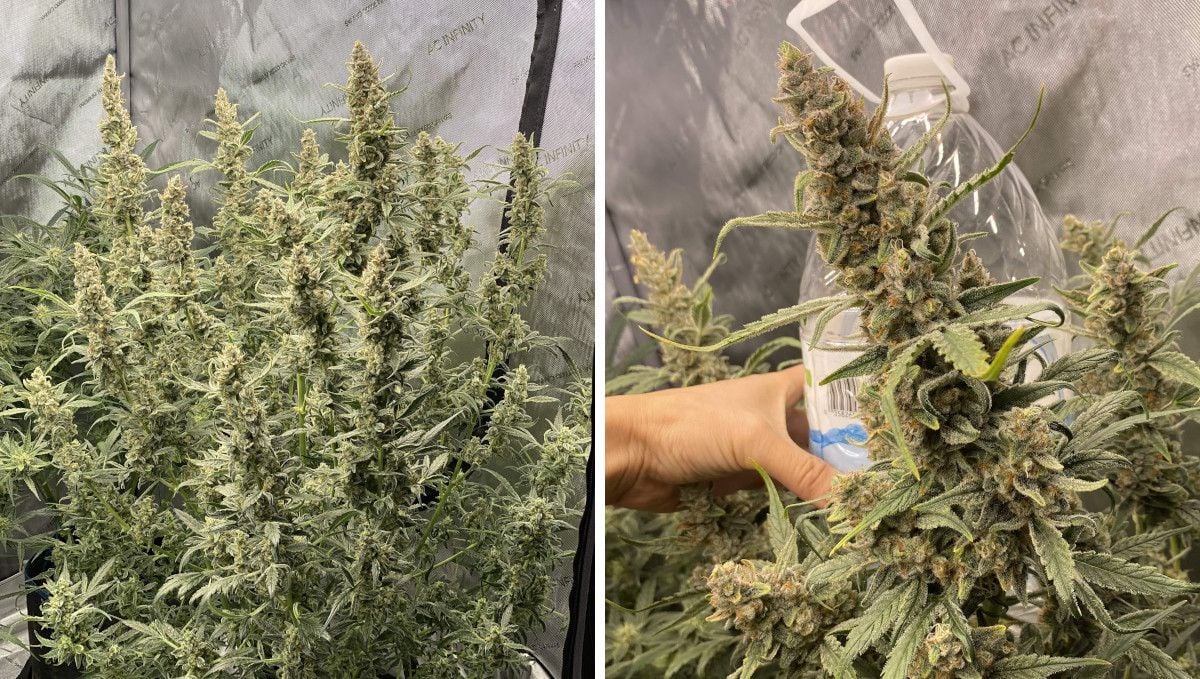
The most important tool for you right now is a hand microscope which will allow you to inspect the color of the trichomes. To the naked eye, they may seem just plain white, but under a microscope, you'll see that some of them are clear and others cloudy and some have changed their color to amber. Always harvest your buds when all of the trichs are milky and some are amber. This is the moment of peak psychoactivity.
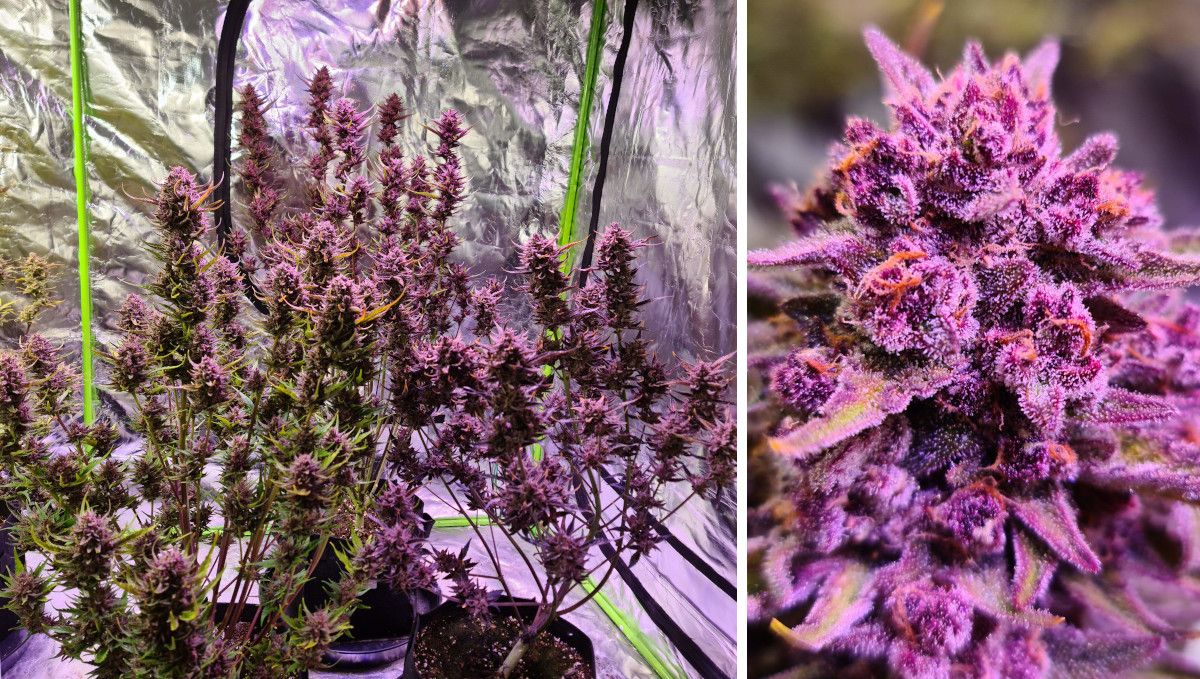
Don't forget that to achieve the highest possible quality of your smoke, you'll need to flush the medium to cleanse it of the built-up salts. When you grow in soil, this process may require up to 2 weeks. In hydro and coco, it's much quicker – only one week. Try to time the whole procedure in such a way that the trichomes are at the peak of their maturity right when the final flush is over.
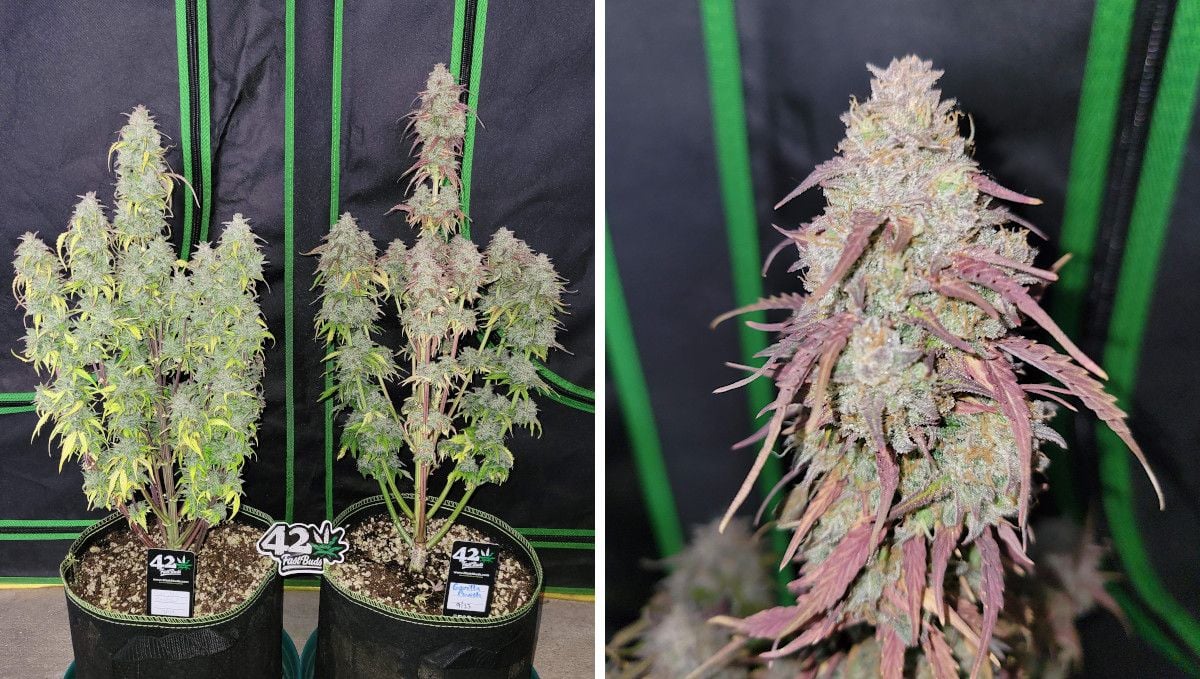
Keep in mind that the quality of your smoke depends on what you do AFTER the harvest almost as much as BEFORE it. Always be sure to dry your buds slowly so that important chemical reactions inside them have enough time to finish – this will cure out a nasty smell of fresh hay and bring out the rich terpene profile of your premium genetics.
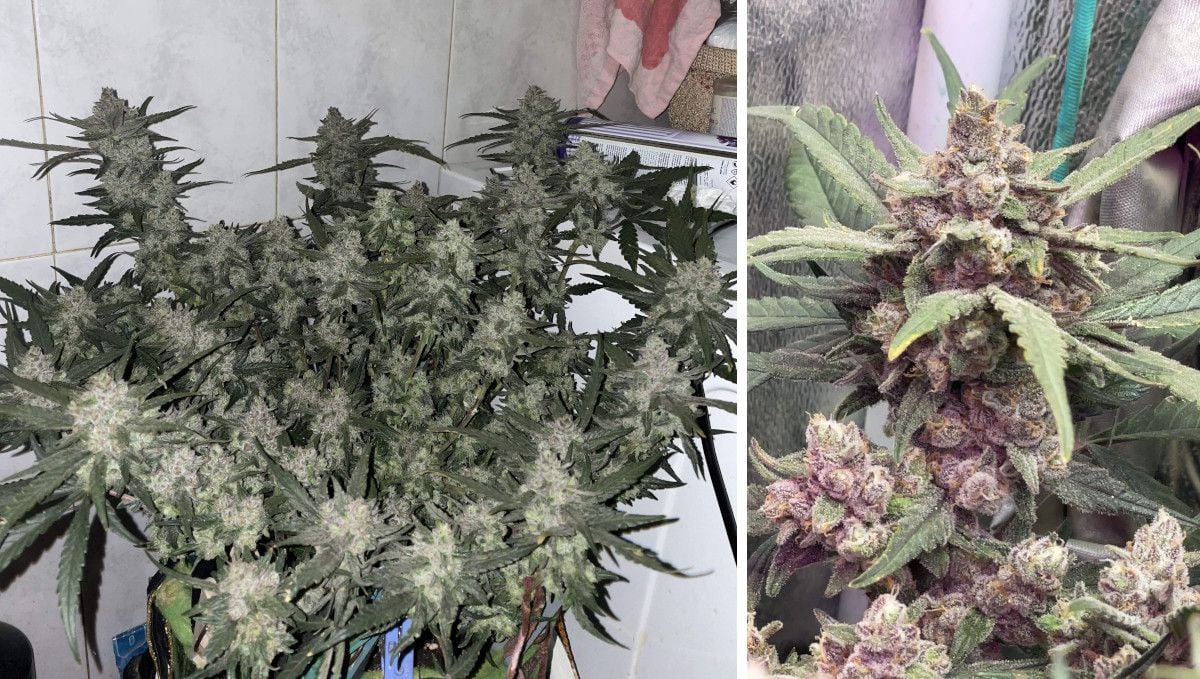
Even more important is curing. It’s when you keep the dried buds in mason jars, air them once or twice a day, and keep doing it for a few weeks – long enough to release the excess moisture slowly and make sure your smoke is at the peak of potency and organoleptic qualities.
10. The Outcome
As you can judge by the table below, Gorilla Punch Auto is a strain with a flowering time that is just about average but with the yields that are quite high. We only hope that your result of growing Gorilla Punch Auto will be just as generous.
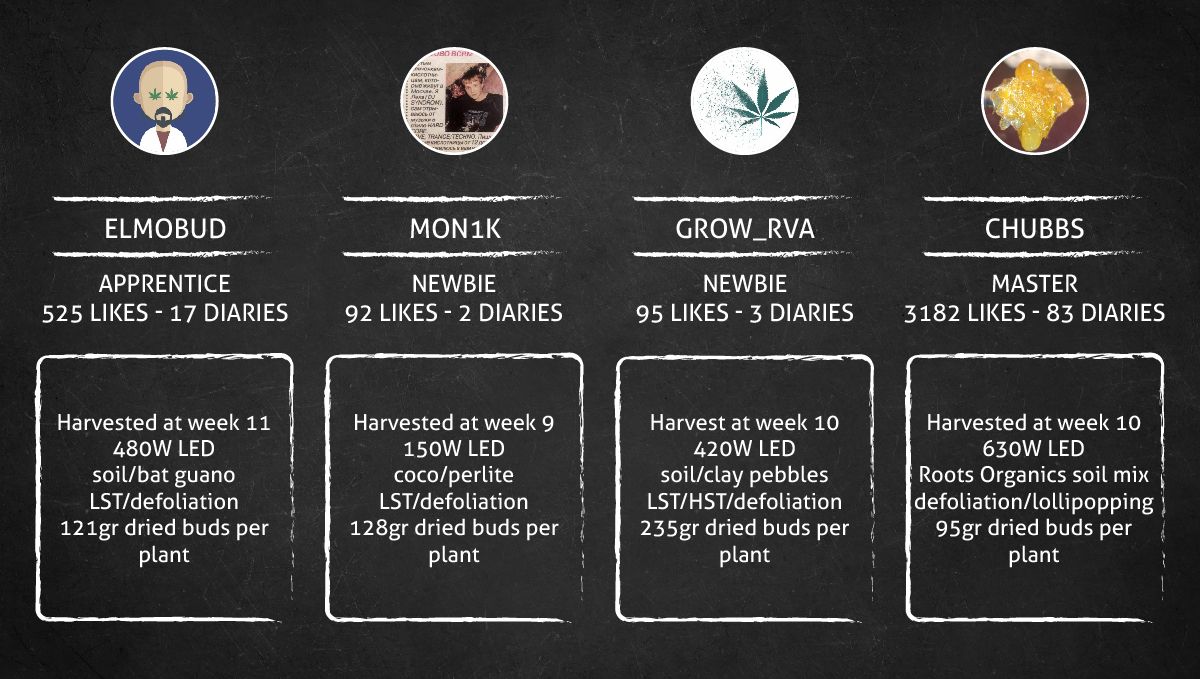
Gorilla Punch Auto Yield
The result of Grower A was outstanding. Though the nugs weren't the biggest, they were remarkably dense and there were so many of them that the final haul was impressive – 121 g (4.28 oz) on average from each Gorilla Punch plant.
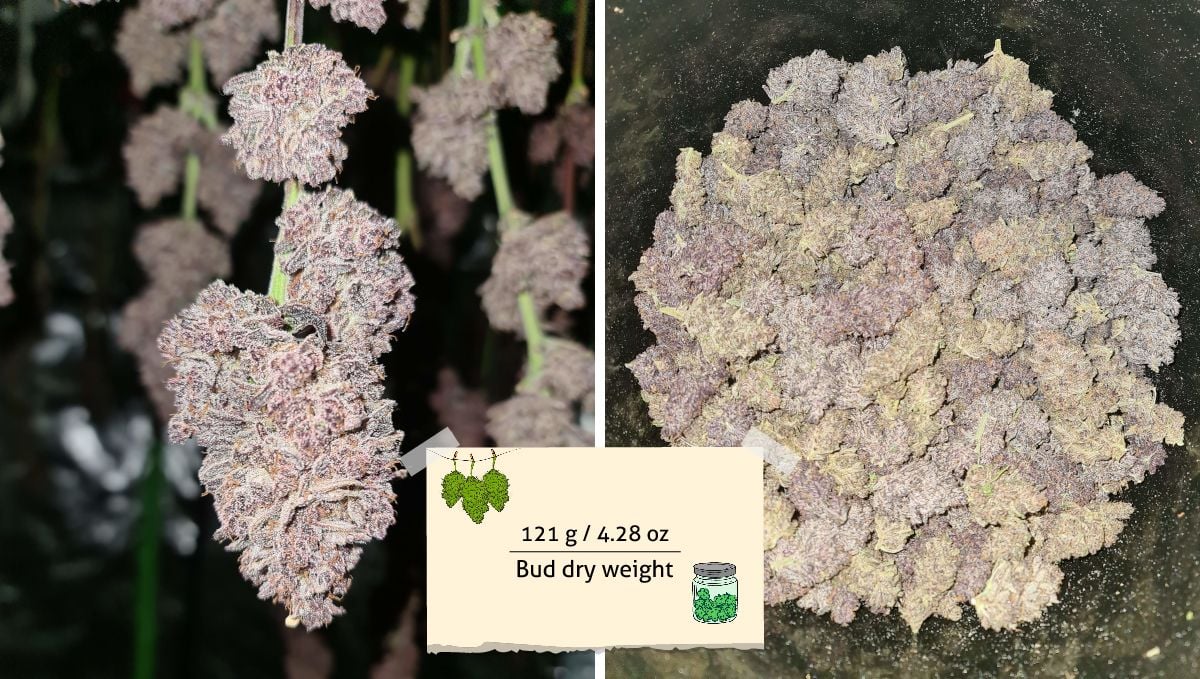
Grower B’s plant was even more impressive, especially if you take into account its more compact size. This stocky, multi-cola Gorilla Punch yielded 128 g (4.52 oz) in 12 weeks from seed.
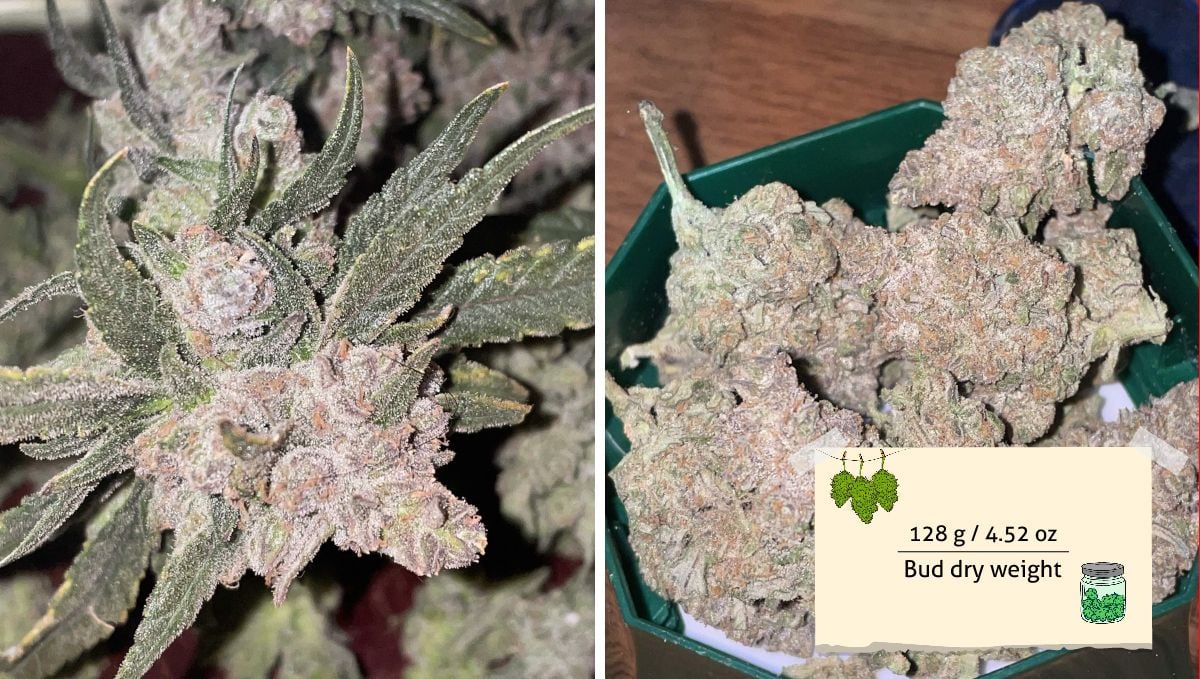
Grower C cultivated his Gorilla Punch as a large, multi-branch super bush and harvested 227 g (8.3 oz) -- which is the record out of the four grows in our week-by-week guide.
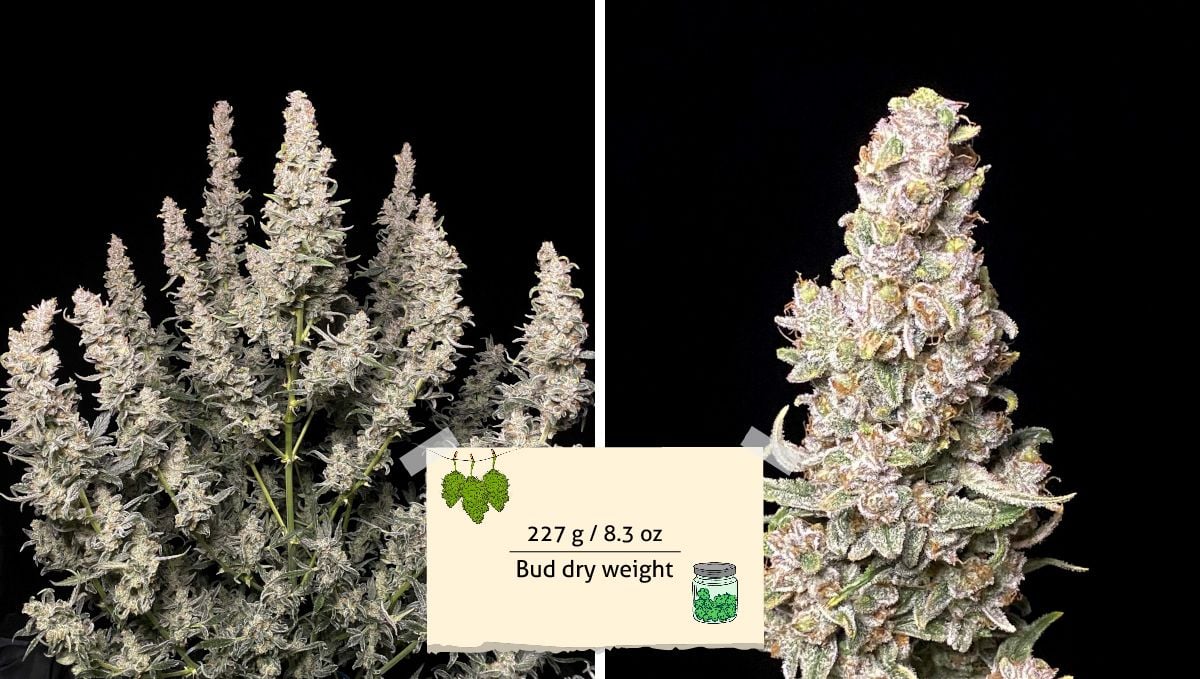
Finally, Grower D, who won an American Autoflower Cup with this grow, got 95 g (3.35 oz) on average from each of his two award winners.
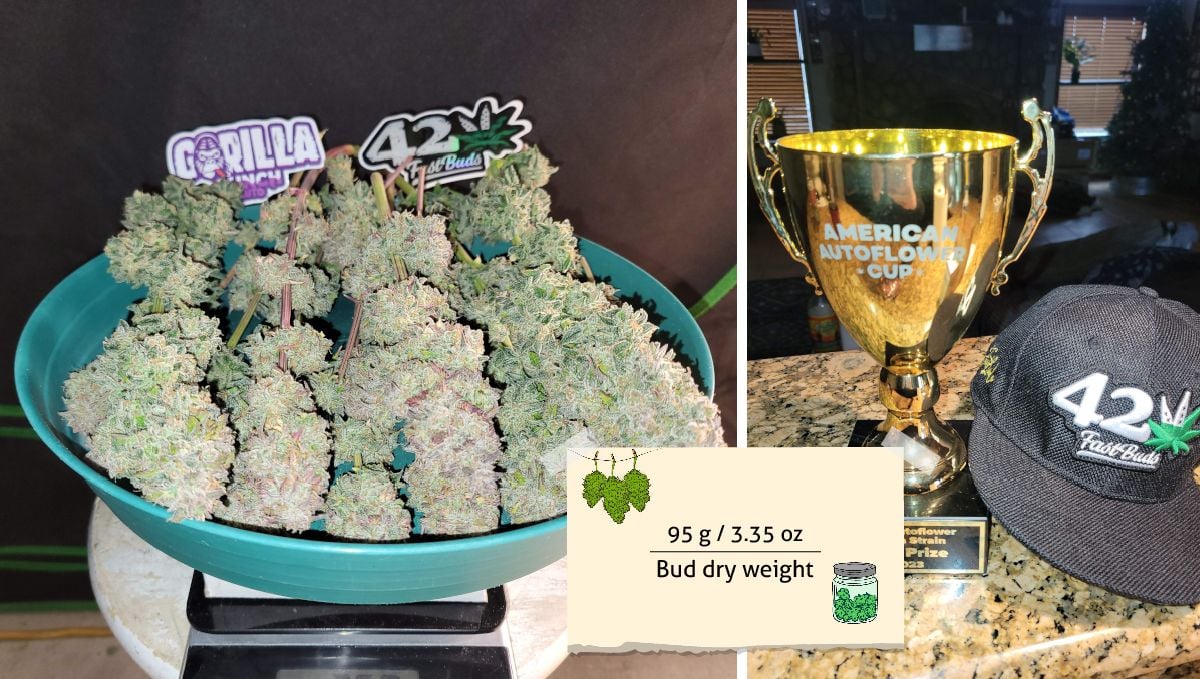
Gorilla Punch Auto Smoke Report
Gorilla Punch Auto is consistently described as a potent strain that is suitable for evening or nighttime use. It is praised for its strong and delicious taste and aroma, with fruity and gassy terpenes being prominent. The strain is known for its sticky and stinky buds, often with a hint of diesel. Users report experiencing a strong, relaxing stone effect and a chill sensation.
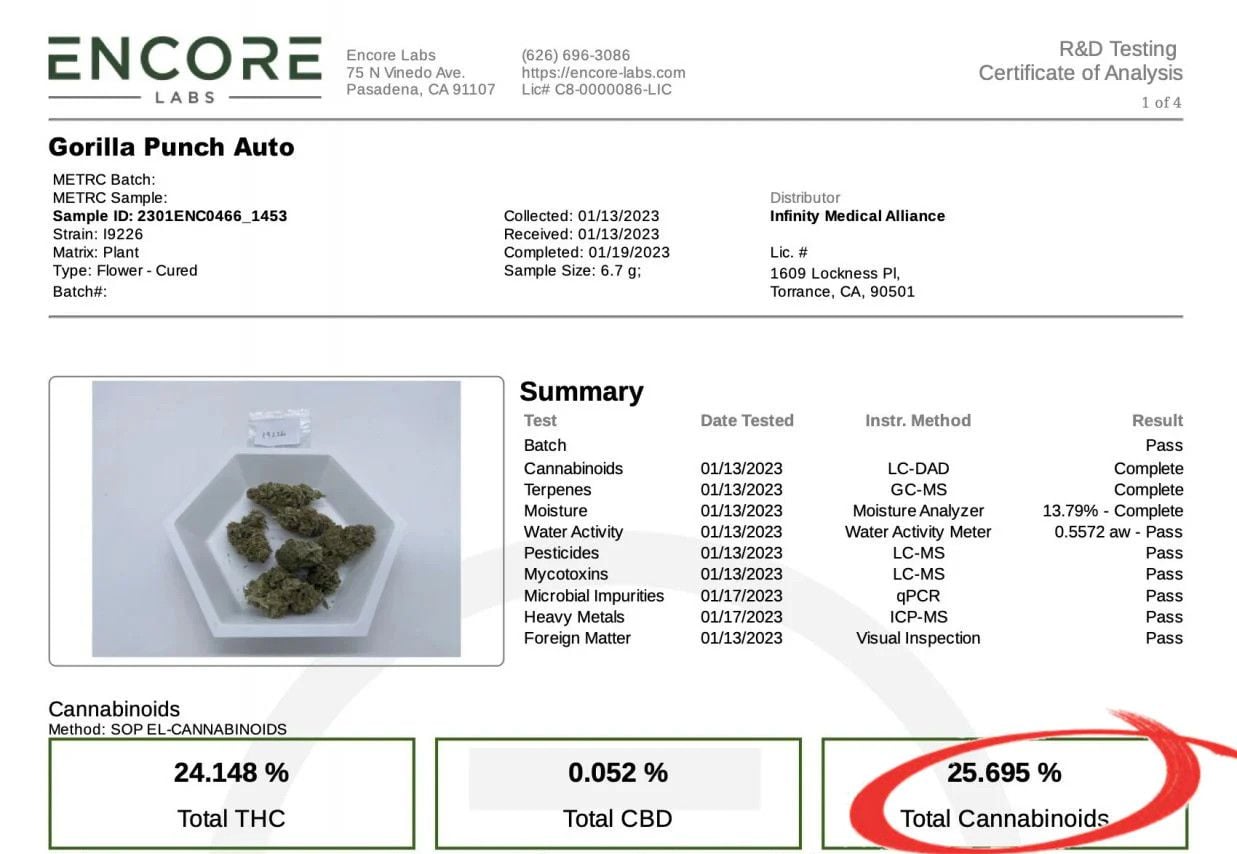
Despite its potency, Gorilla Punch Auto is also mentioned as having a focus-enhancing effect, making it suitable for daytime use when concentration on tasks is required. It is noted to provide a whole-body experience, transitioning from a mind-numbing rush to a more balanced and zen-like state. Some users find it helpful for socialization or describe it as a great strain for anxiety.
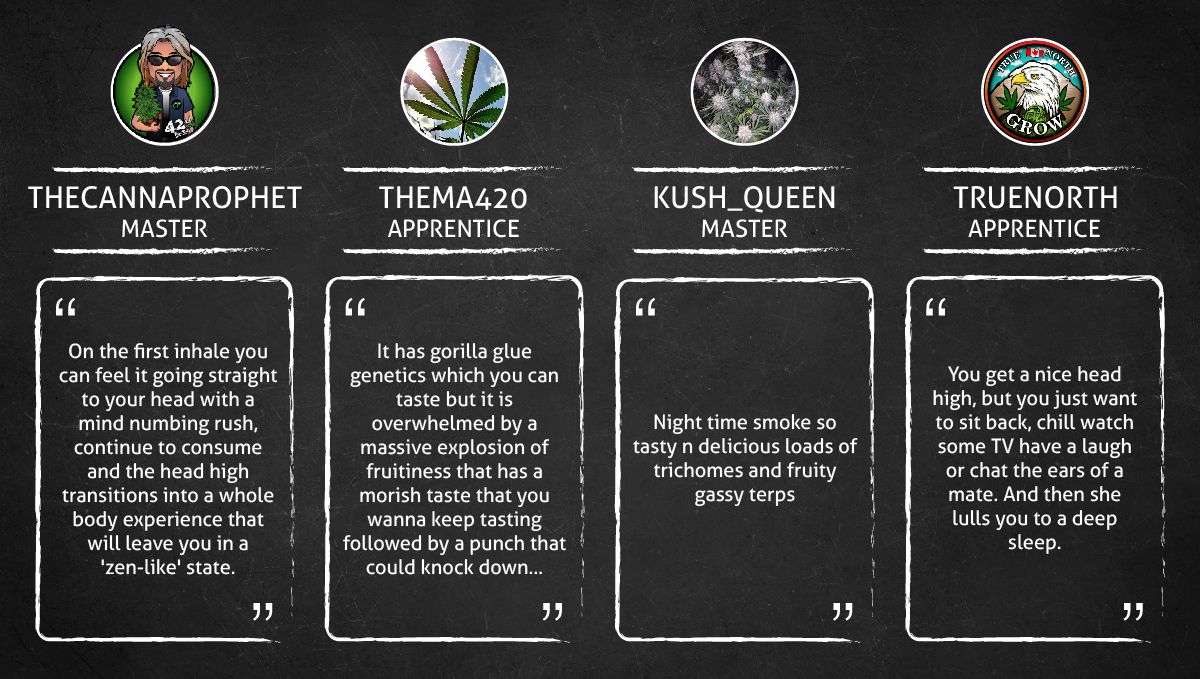
11. In Conclusion
Our Gorilla Punch week-by-week guide is proof that this weed strain is a great way to get super potent smoke with a tendency to improve mood as well as provide focus and increase sociability. This is also a great autoflowering plant that grows vigorously and performs as a cutting-edge modern auto should.
For Growers B, C, and D, the whole experience was very short -- only 9-10 weeks from seed to harvest. Grower A had to wait just one week longer, but only because he waited for the buds to become more mature than they needed to. The strain performed equally well in soil and coco mediums. In fact, Grower C got the highest result of the four although he cultivated his Gorilla Punch Auto in soil.
Even if you don't interfere into the way the canopy grows or train it only slightly, the shape of your Gorilla Punch Autoflower isn't likely to cause you troube. With powerful lights, you'll achieve 100% light penetration and your colas will be long and dense all the way down. However, even with a weak light, you're likely to get a generous yield. If instead you prefer to train your autoflowers, Gorilla Punch doesn't seem to mind even high-stress training. At least, Grower B tried this road and achived spectacular results.
To sum it all up, whether you're looking for the perfect cultivar or the perfect smoke, you can't go wrong with Fast Buds' Gorilla Punch Auto. Happy growing!
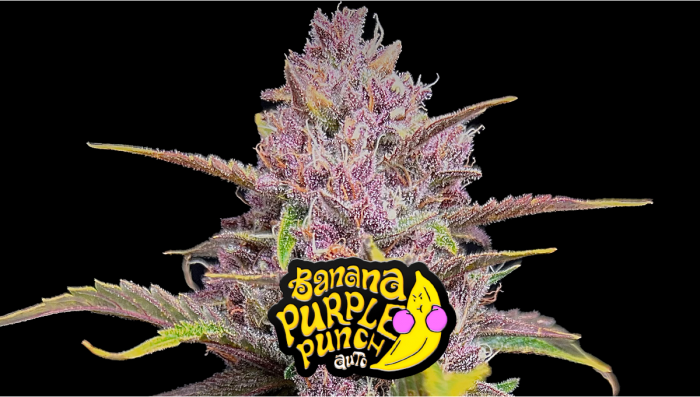







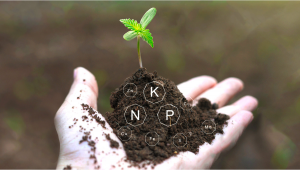
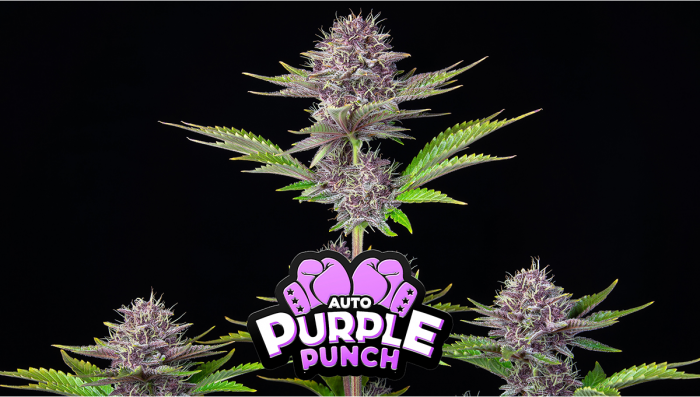

Comments